|
B
R E X I T
ABOUT -
HOME - A-Z INDEX
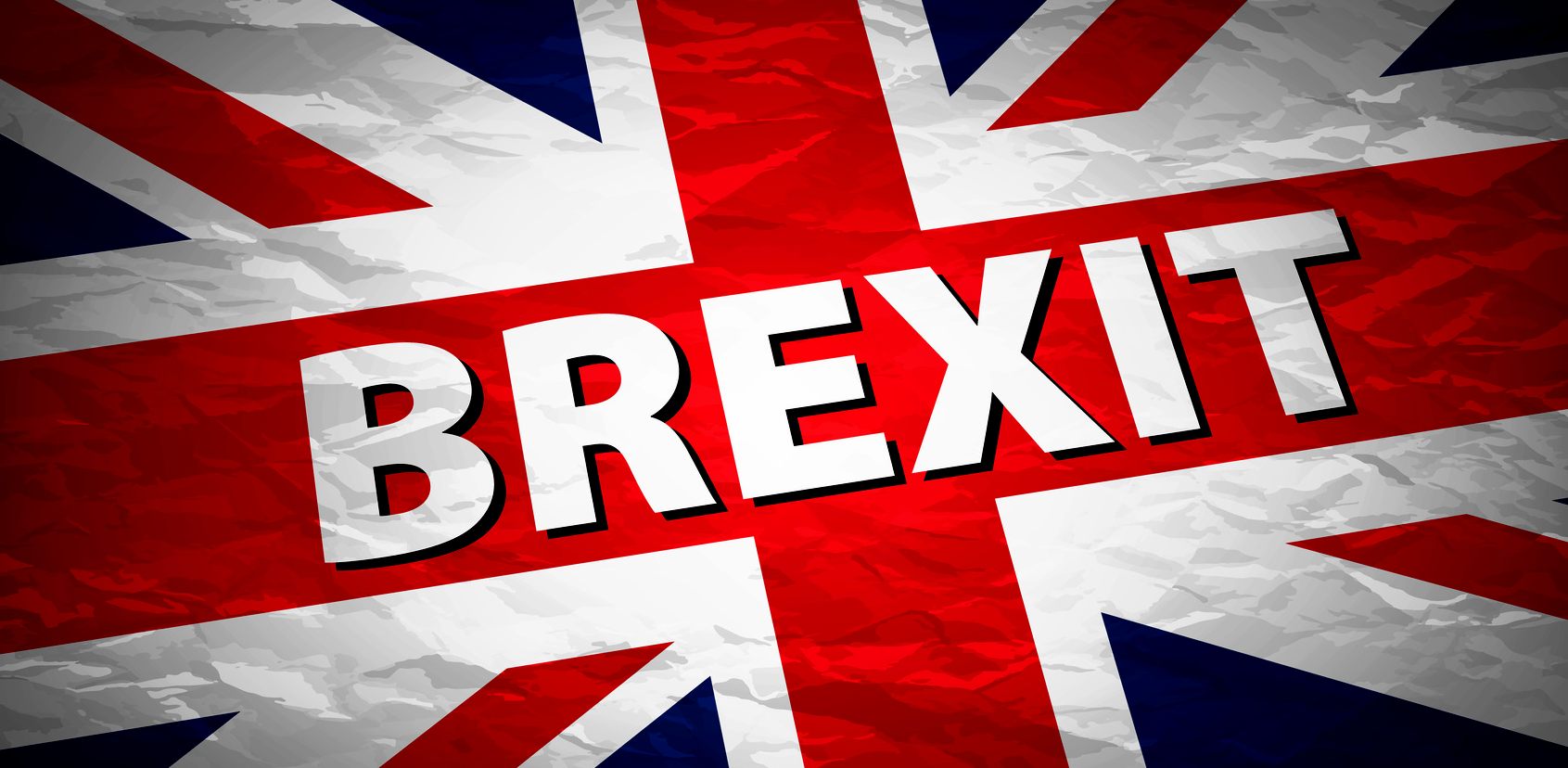
UK
CITIZEN SUPPORT: There are about 3 million EU citizens living in the UK
and the Brexit vote has understandably become a major concern for them. So what will happen to their rights? There is a lot of confusion and there are no guarantees right now.
The current government refuses to give a guarantee that EU nationals will be allowed to stay after the UK officially leaves the European Union. The
Conservative Junior Home Office minister James Brokenshire said that it would not be wise to guarantee any rights right now without a mutual agreement with Europe, regarding the 1.2 million UK citizens living in continental Europe. He said that they can only affirm that EU citizens are permitted to stay in the UK for now.
EU nationals could potentially lose all of their acquired rights, i.e. living and working in the UK without a visa, owning a business in the UK, owning property in the UK and access to public services such as the NHS.
Theresa May, the UK Prime
Minister, has so far said that she won’t guarantee anything, and that the fate of EU nationals living in the UK will depend on negotiations with Europe regarding the fate of UK nationals living elsewhere in
Europe. These negotiations could take years, leaving EU nationals in the dark. She also stated that the EU concept of free movement could no longer exist in the UK.
Labour has condemned this position as being unfair and chaotic for all EU citizens living in the UK because now they cannot plan their lives until this is settled in the future. This could take a few years, possibly more.
Foreign Secretary Philip Hammond is pushing for early talks with Europe regarding the status of EU nationals living in the UK and the status of UK nationals living in Europe. These talks would be held before any formal Article 50 negotiations regarding Britain’s leaving Europe. However, European Commission president
Jean-Claude Juncker states that any informal discussions with Britain will not happen until after Britain officially triggers Article 50.
The Cleaner Ocean Foundation is not normally concerned with the politics of
Europe or the United Kingdom. We are though worried about ocean plastic, climate
change and conserving our natural environment. Unfortunately, European politics
appears to us as a potential blocker to a possible (part) funding avenue
that may have helped SeaVax
and RiverVax
cleaning vessels see the light of day. Since 2017, Brexit has bogged the
UK down in a political mire. In 2023, the truth of the matter is
surfacing, against a background of corruption allegations in the European
Union. With the UK being barred by the EU, suggesting that when the
Foundation applied for funding under their Horizon 2020 programme, the
word was already out to sideline applications from the UK. If that is
true, SeaVax
never had a chance. Also, as it turns out, rather a shame for the Caribbean
islands affected by Sargassum.
Indeed, Brexit politicians (Cameron,
May and
Johnson:
Conservative Party)
may have cost the ocean a potential clean up solution, in addition to a
cost of living and pension devaluation crisis. We wonder if this is how it
appears to readers? The fact is that seven years on, and opinions have
changed, since all those promises turned out to be pie-crust.
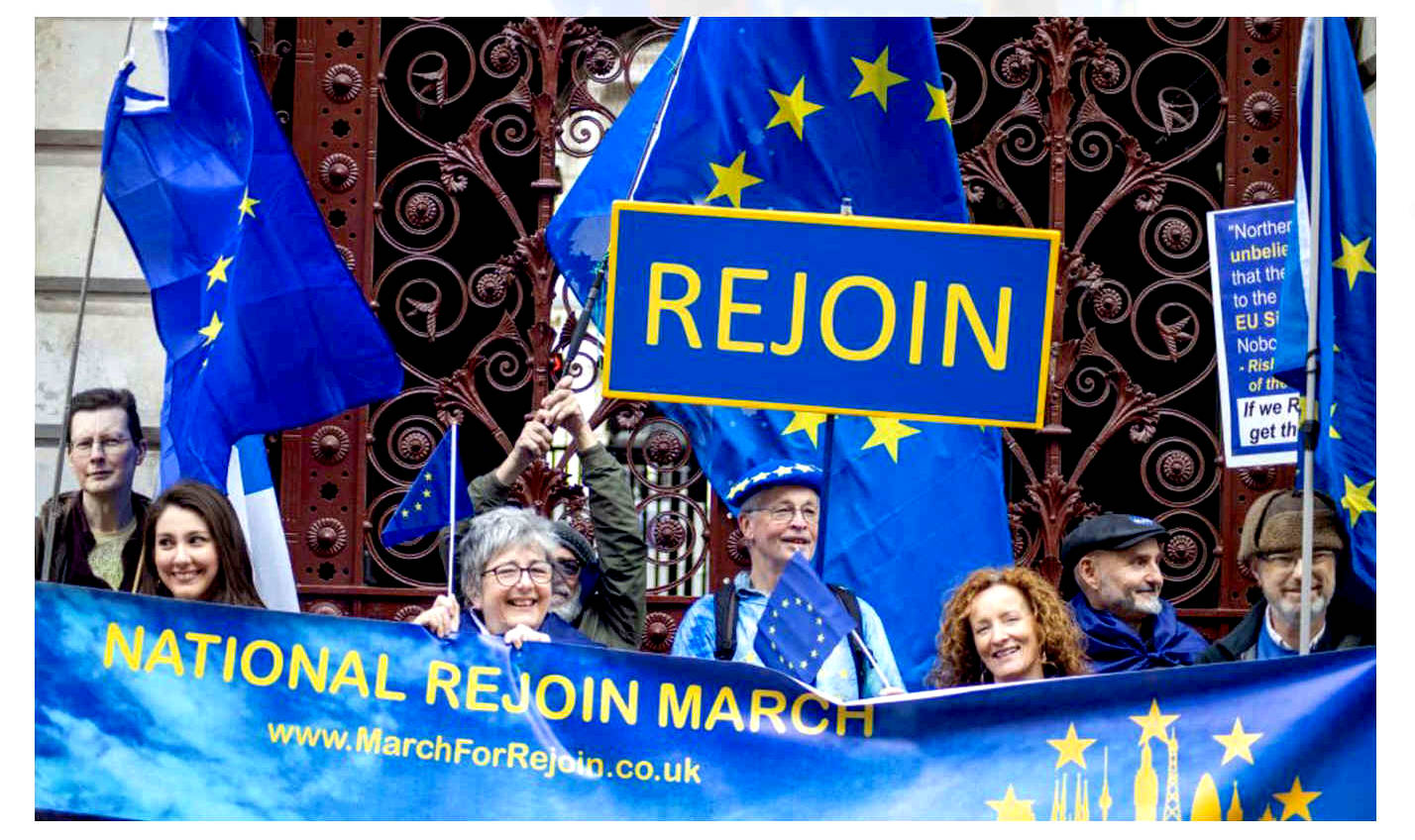
SEVEN
YEARS ON
The 23rd of June 2016 is a milestone in our national
history that evokes sadness and regret rather than celebration.
We don’t need to rehearse on this seventh anniversary all the ways in which Brexit has disappointed even those who voted for it. Farage and Redwood, along with Boris Johnson, Michael Gove, Jacob Rees-Mogg and the rest, promised increased prosperity, cheaper food, flourishing trade and a flush NHS. They said we’d be free of all that tedious European red tape and would take back control of our borders, encouraging anyone agitated by immigration to believe that fewer people would come in. There would be no downside, only upsides. As David Davis pledged soon after the vote, our exit deal would “deliver the exact same benefits” as EU membership.
WHAT
A LOAD OF TOFFEE
Look around to see how all that turned out. Britain is in the grip of a cost of living
crisis, food prices are rocketing, trade is either down or static while it’s surged for our EU neighbours, and the NHS is ailing. Post-Brexit red tape is strangling thousands of small businesses, whether travelling musicians or exporters of goods, tying them up in daunting forms or extra charges that cost time and money they don’t have. Those who thought legal migration of 330,000 people a year was too much when they voted in 2016 now contemplate an annual figure nearly twice as high: 606,000. As for the terms of our exit, ask anyone who buys from, sells to or is stuck in a queue to visit the continent if we enjoy the “exact same benefits” we once did.
These are not remainer facts. They are facts understood and absorbed by a growing majority of the British people, including a good chunk of those who voted leave. As the polling guru John Curtice notes, just 33% of Britons now believe the 2016 decision was the right one, while 55% say it was wrong. More striking still, as many as 59% say they would vote to rejoin the EU if given the chance, with just 41% preferring to stay out.
Combine those two facts – that Brexit has proved to be both disastrous and unpopular – and it’s easy to conclude that it’s only a matter of time before we reverse the decision we took seven years ago today. Indeed, it’s tempting to look at the 41 years that separated the 1975 referendum that sealed our membership and the 2016 ballot that ended it, reflect that politics moves twice as fast as it used to and predict that it will take half the time to undo Brexit – with a vote to rejoin scheduled for late 2036. After all, it is surely unsustainable to continue on a course that an emerging consensus regards as an act of national self-harm.
Except the world is littered with unsustainable situations that are nevertheless sustained, seemingly for ever. And there are multiple obstacles that stand between us and what, to rejoiners, seems like a date with our obvious destiny.
WE'VE
SHOT OUT BOLT
For one thing, the status quo ante those 59% are longing to restore may no longer be available. The 27 remaining nations of the EU will be understandably wary of plunging themselves once more into the on-again-off-again psychodrama of the UK’s relationship to Europe – a drama that is, in fact, about the UK’s relationship to itself, its struggle to see its place in the world as it truly is and to accept being a medium-sized European power rather than the imperial superpower of the recent past. The member states of the EU would need to know that this time it’s for keeps.
If they do entertain talk of UK readmission, it won’t be on the same terms as before. The UK had a sweetheart deal – including a hefty cash rebate, an opt-out on the euro and much more – that the 27 will be reluctant to offer again. Any future referendum is likely to be on a package less appealing than the one Britons cast aside in 2016.
To get to that point, a governing party would first have to put the question. Few are rushing to do that. Labour’s preferred posture is Trappist, hoping to stay mute on the issue lest it unsettle the pro-leave members of its electoral coalition. If it does speak, it is to say that Brexit is done and there will be no change. Even the
Liberal
Democrats, perhaps eyeing pro-Brexit voters in south-west target seats, keep their mouths shut.
Of course, politics is dynamic and those calculations could change. But given the tortuous process of EU-UK negotiation that would be involved, rejoin is a project that could span two parliaments: which party would willingly commit that much political capital to such an endeavour? Especially when you consider that “Europe” has lost much of its salience. In 2019, 70% rated it as the most important issue facing the country; now just 19% say that.
More poignantly, rejoin is predicated on the notion that Britons miss what they no longer have. What if that feeling dissipates, as memories fade? “A generation brought up without the Erasmus scheme and who find it easier to travel to the US than to the EU will think differently,” says Anand Menon, director of UK in a Changing Europe.
All these obstacles are real. None can be wished away. Which is why rejoiners need to look to the likes of Farage and Redwood for inspiration. The long march from 1975 to 2016 required a dogged, even obsessive, persistence and, as important, a strategic patience. They didn’t move straight to their end goal: before they were Brexiters, they posed as mere Eurosceptics. They were prepared to play the long game, inching incrementally – a rebellion over the Maastricht treaty here, opposition to joining the euro there – towards their ultimate goal of exit. Sad to say, it worked.
Rejoiners should do the same. Start with commonsense, popular demands – say, a new, reciprocal exchange scheme for young people, closer cooperation on security or shared food safety and environmental standards – moves only an ideologue could oppose. A review of the EU-UK trade agreement is due to start in 2026: with a
Labour government in place, that could be the vehicle for steady, gradual convergence. After that, the Overton window could be sufficiently open to let in a conversation about re-entering the customs union and the single market. And once you’re talking about that, rejoining the EU itself becomes the natural course of action.
Step by step by step. Mocked and on the margins at first, dismissed as unrealistic or swivel-eyed, prepared to be a Europe bore – the Brexiters showed us how it’s done and what it takes. It might be harder for us than it was for them. We have the young, but they had the old and the old vote. We have facts, but they had myths, and myths are often more potent. Still, theirs is a path worth studying. It led them to a rupture from our neighbours. It might just lead us to a reunion.
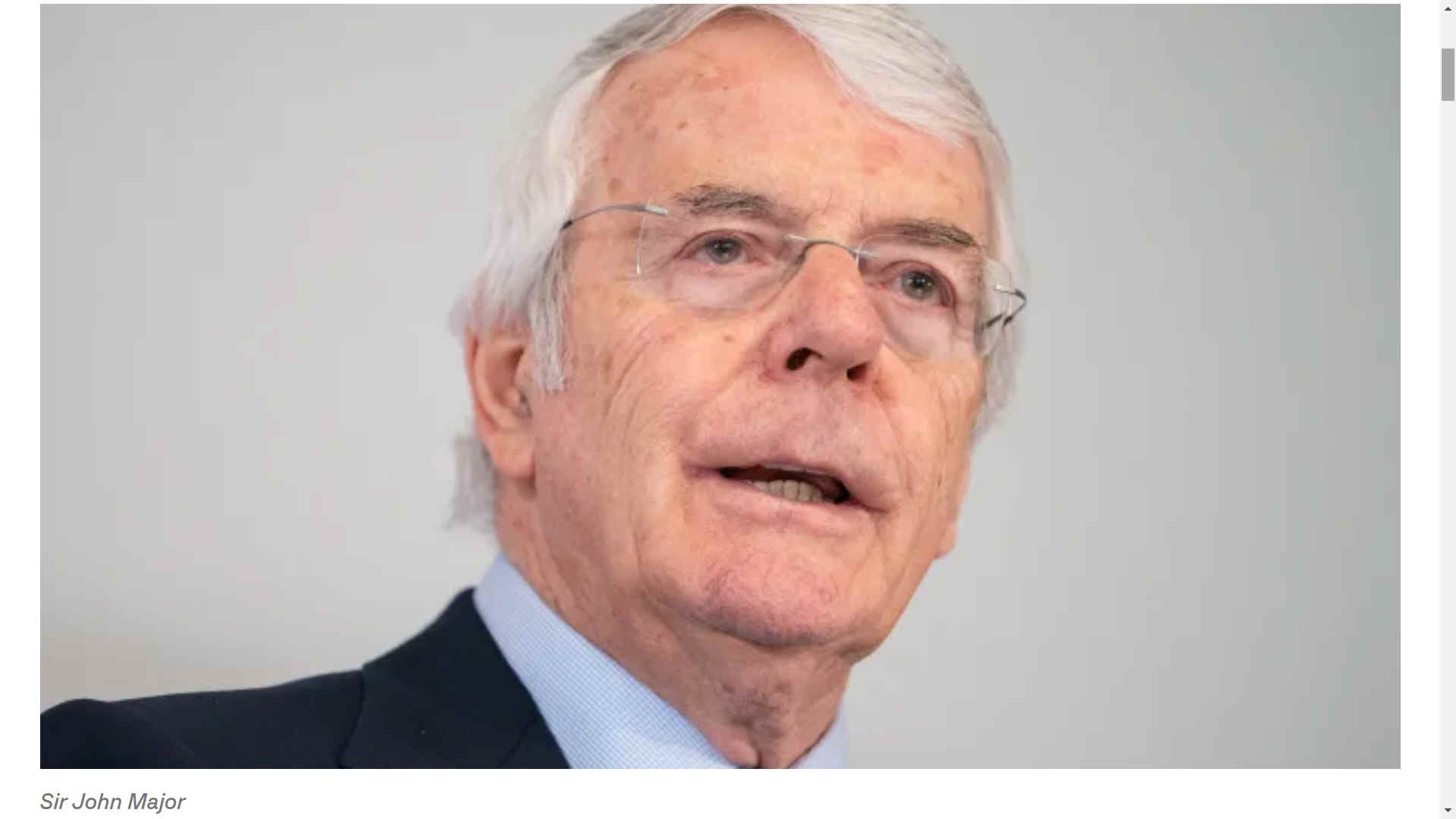
It certainly appears that way to former Prime
Minister, Sir John Major:
"has told the Northern Ireland Affairs Committee Britain made a “colossal mistake” when it left the European Union,
Sir John said while he is not a “significant Europhile”, he believes the UK was stronger in the
EU. The ex-PM was appearing before the Northern Ireland Affairs Committee, which is investigating the effectiveness of the institutions of the 1998 Good Friday Agreement.
Alliance Party deputy leader Stephen Farry asked if it was an advantage for the UK to be in the EU during the early days of the peace process in Northern Ireland in the 1990s.
Sir John, who campaigned to remain in the EU ahead of the 2016 Brexit referendum, said membership of the bloc “smoothed the way” for many of the agreements at the start of the process.
He said a lot of business was conducted on the fringes of EU meetings. He said: “It was a very useful tent in which we could operate discreetly.
“We used that tent to the full.” Sir John added: “Ireland are our nearest neighbours. That relationship with Ireland mattered then and it matters now.
“We are out of the European Union and they are in it. “They are one of the ways we may stretch out and recover some of the things we so wilfully threw away when we left the EU.”
Sir John said he does not believe the EU is anything close to perfect. “Because I negotiated the Maastricht Treaty, the ultra Brexiteers regard me as a significant
Europhile. “That is not actually true. I am a very practical European. There are many things I don’t like. But I look at the package and I say, ‘Are people in my country better off and safer if we were inside the European Union or if we were outside?’
“I reached the conclusion we would be better off inside.
“There are three great power blocs in the world today. United Kingdom is not one of them. There is America, there is China and there is the European Union.
“Europe is going to face immense economic competition from both America and China. It may face military insecurity problems with China.
“Is Europe better able to represent its people with the United Kingdom inside making it stronger or outside making it weaker?
“I think not just us but the whole of Europe is stronger with Britain in it.”
He added: “When I look at the interests of my children and my grandchildren, I think their future is brighter if they are part of a really big bloc who could work with us if we are in difficulty.
“Suppose we had a socking great row with China. Britain decided to put sanctions on China; China wouldn’t be much bothered.
“If the European Union did because we were being maltreated, they would feel quite differently about it.
“It is those strategic issues which make me believe we should be in Europe and that we have made a colossal mistake in leaving.
“I understand the sovereignty arguments, though many of them are more semantic than real. No country, not even the United States, has pure sovereignty.
“Who has pure sovereignty in Nato? We all sign up to Nato; nobody complains about that.
“I wonder how many of the cuts we have had, or the shortages for our public services, would not have happened but for the loss of GDP because we have left the European Union?”
WHY BOTHER FOLLOWING NEGOTIATIONS?
We are forced to follow the negotiations
- in case there might still be a change for SeaVax. And if possible, inject
some common sense into the Brexit equation across all parties (doubtful). We have reprinted some of the
media coverage on the proceedings and if appropriate, included comment.
As
of 2022, the failure of the parties to conclude Brexit negotiations has
prevented the UK from either applying for or joining Horizon
Europe grant funding, in any measure, including hydrogen,
solar or other marine zero
emission waterborne transport research. We also feel, the Brexit
played a part in the Commission refusing applications under the Horizon
2020 agenda, by scoring down applications that included our Foundation
- because were are based in England.
This
is of course the fault of the British voting public, and British
politicians fueling Anti-European sentiment for their own political gain.
Moves that were bound to antagonize
Brussels in voting to leave. And to cap it all, based on untruths during
campaigns, where it appears that a gullible British electorate were not
furnished accurate facts. Even the
Crown was duped. One reason we advocate complete
transparency and accountability in policy making - and on that score -
Brexit underlines what happens when politicians are allowed to exaggerate.
We advocate zero tolerance to what amounts to fraud.
Leaving
the EU was not a sentiment of the
Foundation. Despite which, our ocean cleaning research has suffered.
Bringing to a halt, our efforts on SeaVax. Now shelved to prevent mounting
losses sinking other worthwhile projects.
The
message is clear. Politics decides research funding. For that reason, we
will endeavour to take more of an interest in policies and policy makers -
perhaps even, with a view to lobbying against climate
deniers and ecocide. For that might help us decide what
projects may achieve funding, and help to get like minded projects funded,
for others and ourselves. For it matters not who carries out the R&D,
so long as it get done.
DAILY
EXPRESS NOV 14 2018
THERESA May’s Brexit agreement meeting with Cabinet Ministers has seen the
Fishing for Leave group issue a statement revealing that they believe that the Prime Minister will have “sacrificed fishing” to satisfy to EU Brexit demands.
The fishing industry reacted to the news that negotiations had finally concluded an EU and UK deal with cynicism. Fishing for Leave issued a statement saying: “The Final issues on May’s deal are now resolved, we guess, to the EU’s satisfaction. “We hope however it is not yet more capitulation from the Prime Minister.
Prime Minister May received backlash over this plan from her own party members in addition to the opposition as she introduced the idea of a transition period were EU laws would still apply to the UK.
The Fishing for Leave group continued: "Resolving the final five percent of a stinker doesn’t make it stink less!
"The Transition still means obeying ALL EU law, allowing the EU to enforce detrimental laws to massacre what’s left of the British fleet.
“This would allow the EU to cite international law (UNCLOS - Article 62.2) to claim the "surplus" resources Britain would no longer have the fleet to catch.
"If Mrs May has capitulated to EU demands to sacrifice fishing for this deal it is even more reprehensible. MPs in coastal constituencies and beyond will be massacred.
"Being a free, sovereign nation after the short term of separation is a far bigger boom than staying shackled as a vassal state to a failed EU we voted to Leave.
"It's vital MPs stick by No Deal is s Better than this Bad Deal & chuck chequers to Stand Up for Brexit and Save Britain’s Fish."
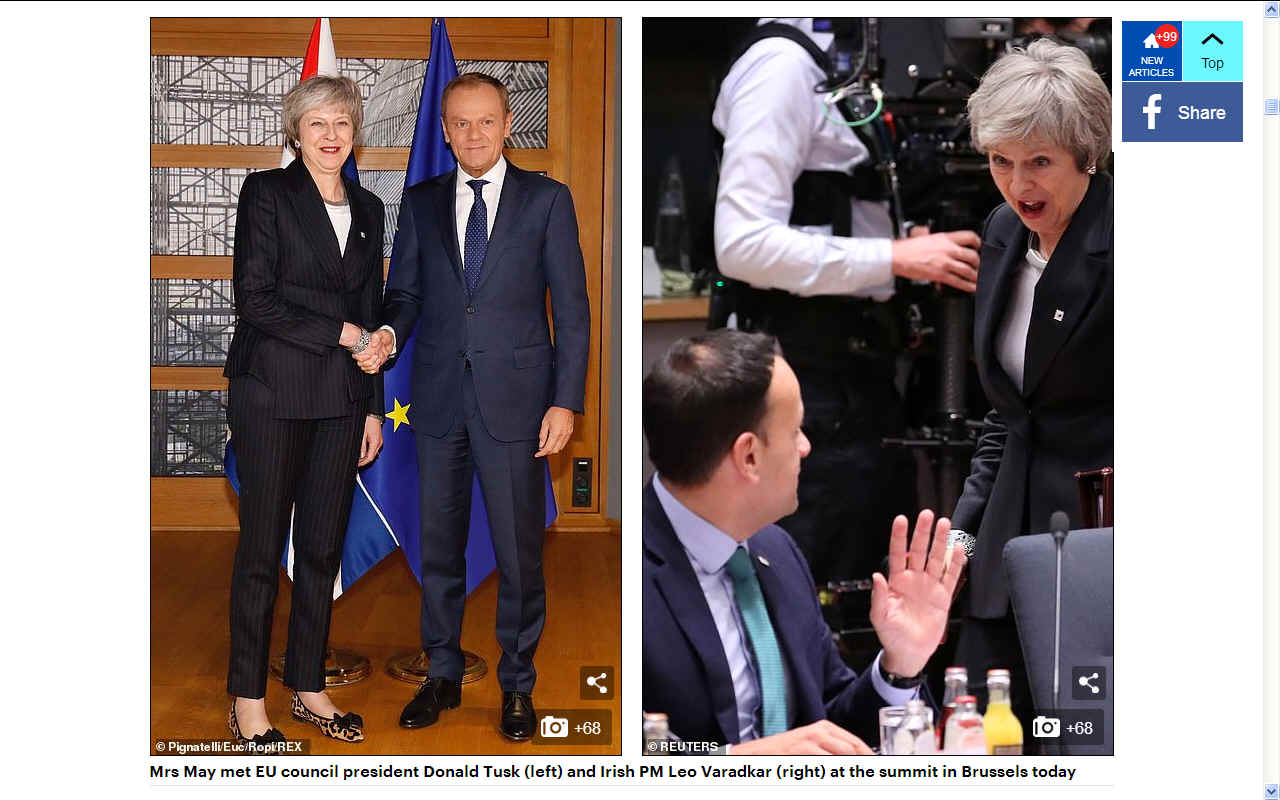
NO
DEAL BREXIT: 13 December 2018, EU leaders gave Theresa May assurances this evening that they would try to agree on Brexit by 2021 – so that the contentious backstop is never triggered.
However, on the Prime Minister's Withdrawal Agreement, the 27 national leaders were firm, saying: ‘It is not open for renegotiation.’
Tusk also called for heightened preparedness at all levels for all possible outcomes - including a 'no deal' scenario.
That deal was struck last month but she has since gone back to Brussels for more assurances so that she can get it past her own MPs.
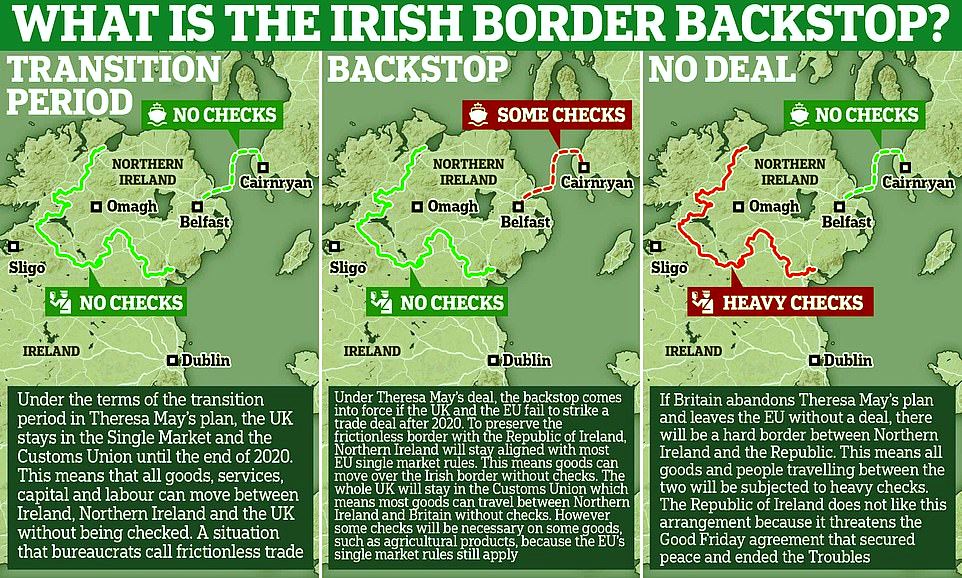
Speaking in Brussels on Thursday, Donald Tusk, President of the European Council, said the EU underlines that the backstop is an insurance policy to prevent a hard border in Ireland.
Tusk said: 'Today Prime Minister May informed the leaders about the difficulties with ratifying the deal in London and asked for further assurances that would at least in her view unlock the ratification process in the House of Commons.
'After discussing the Prime Minister's intervention among the 27 leaders, and bearing in mind our full respect of the parliamentary process in the United Kingdom, we have agreed the following: first, the European Council reconfirmed its conclusions of the 25th November 2018 in which it endorsed the Withdrawal Agreement and approved the Political Declaration.
'The Union stands by this agreement and intends to proceed with its ratification. It is not open for renegotiation.'
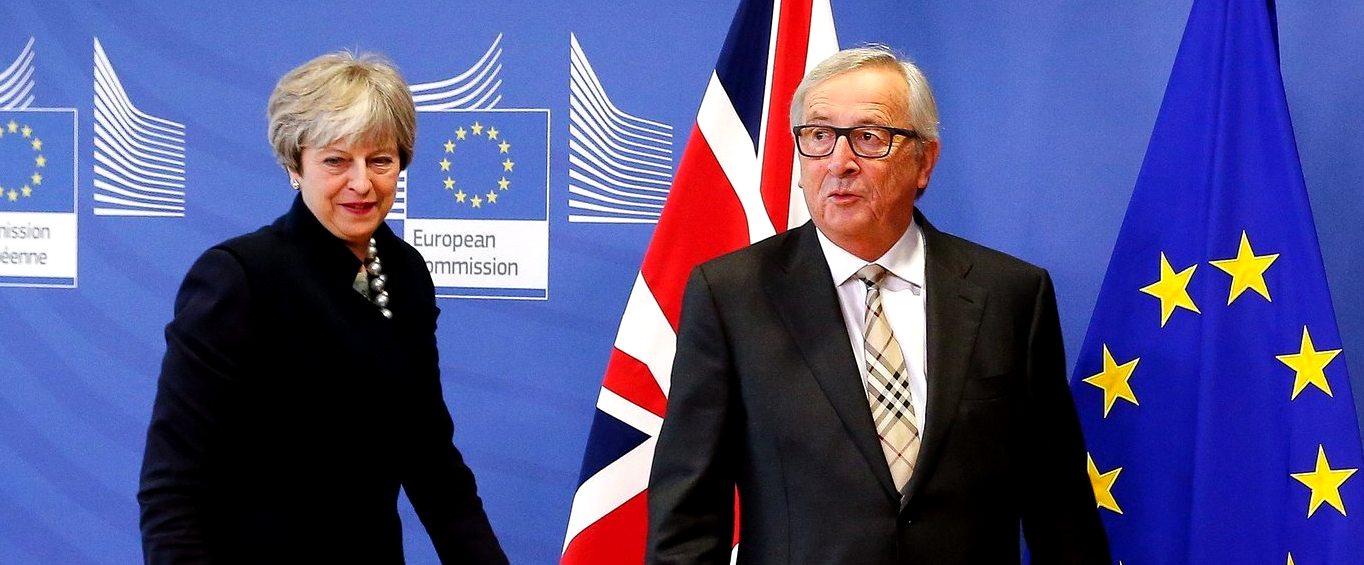
DIVORCEES:
Theresa May and Jean Claude Juncker looking something like the state of Brexit
negotiations - a little uneasy as they work to decouple in the public glare.
Why it was that some politicians said that the UK could enjoy the same
benefits as non EU members, as when EU members is a mystery. Clearly, this
cannot be the case, or why bother joining the EU in the first place. Another
question might be - what are the tangible benefits. Is there any law about
misleading the public during elections? If not, perhaps there should be.
NEW
YORK TIMES 4
DECEMBER 2017
"The people of the U.K. must be given a vote on the deal and an opportunity to exit from Brexit.”
To move the talks forward, Britain and the European Union were supposed to make “sufficient progress” by the end of next week on three areas: Britain’s outstanding financial commitments to the other 27 nations in the bloc; the rights of European citizens living in Britain; and the status of the border between Northern Ireland and Ireland, which will remain in the
European
Union.
Mrs. May had already made serious concession on two of the issues.
Last week, Britain (reportedly)
agreed in principle to write a divorce check estimated at
£47 billion to £53 billion ($53 billion to $65 billion
dollars), more than double its initial offer.
And Britain was expected to concede that the European Court of Justice — the highest arbiter of European Union law and an institution loathed by hard-line British nationalists — could have a possible role in adjudicating the rights of European Union citizens after Brexit.
[Tricky, as anyone knows who has ever applied to the ECHR
knows, they reject most cases without any explanation as to
the reasons, making them totally unaccountable]
Mrs. May’s government appeared to have reached a compromise that would effectively allow Northern Ireland to behave as though it were to remain in the single market and customs union, while technically leaving, along with the rest of the United Kingdom.
The compromise was intended to help prevent the re-imposition of customs checks at the frontier, the land border between the
United Kingdom and the European Union.
But on Monday the Democratic Unionist Party, a faction that is crucial to the ability of Mrs. May’s Conservatives to command a majority in Parliament, rejected that compromise.
Ireland’s leader, Prime Minister Leo Varadkar, said he was “surprised and disappointed” about the latest developments, given that Mrs. May had agreed to support the draft text in principle only a day earlier.
The rumored deal on the border with Ireland immediately set off an outcry in
Scotland and in London, where a majority of voters voted to remain in the European Union.
Nicola Sturgeon, Scotland’s first minister, demanded treatment similar to that Mrs. May proposed for Northern Ireland. London’s mayor, Sadiq Khan, made the same case for his city, the majority of whose voters also opposed Brexit.
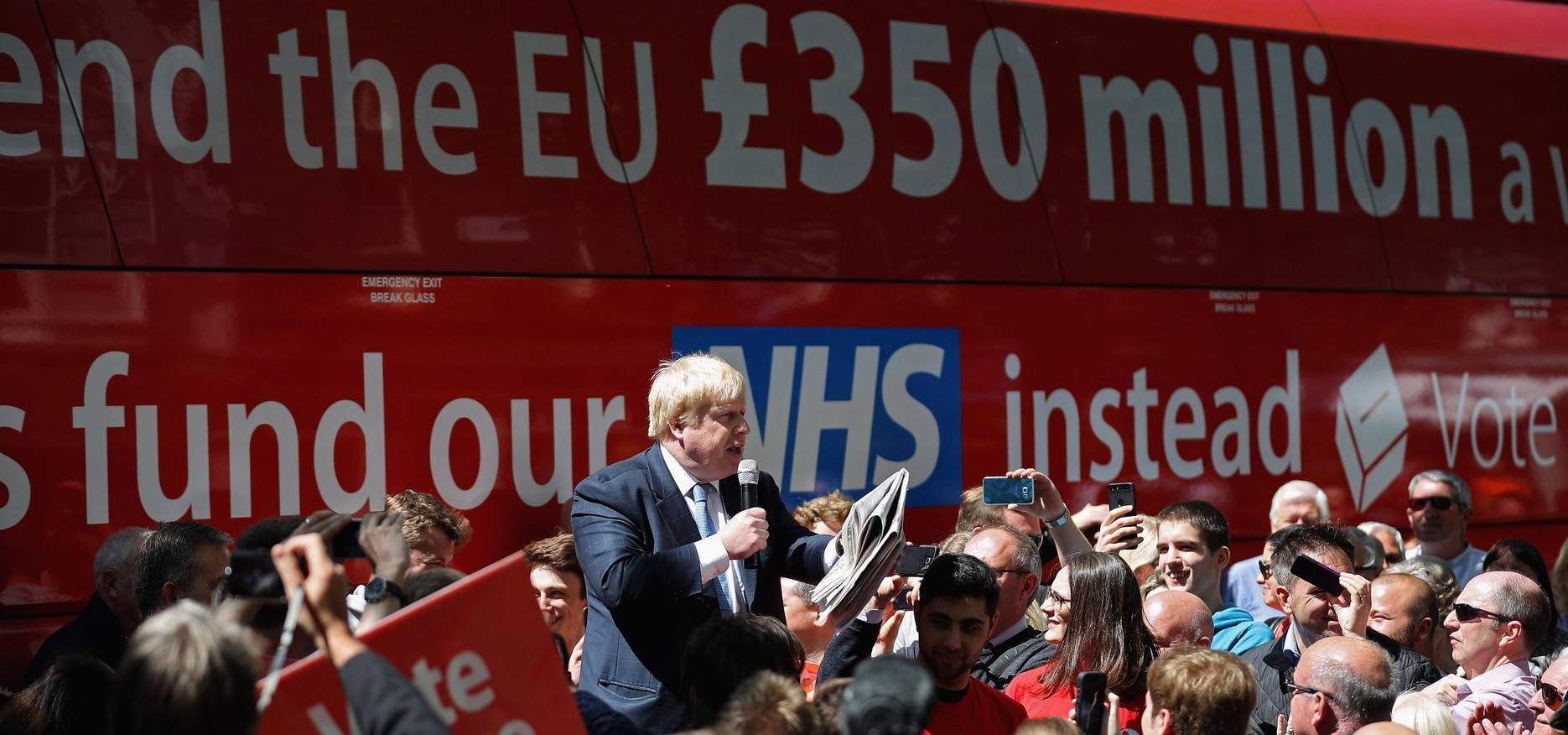
EX
LONDON MAYOR: Boris Johnson campaigning in favor of Brexit
in York, England. Foreign Secretary Boris Johnson, one of the leaders of the 2016 ‘Leave’ campaign,
is quoted as saying it was: “time to get the ship off the rocks”.
Funny that. To which rocks was he referring to and is not the
UK now firmly squeezed between a "rock and a hard
place"?
BREXIT
QUESTION BY CLEANER OCEAN FOUNDATION 9 NOV 2017
Our
delegate apologized for the fact that the United
Kingdom had voted by a majority to leave Europe, because
he was not in favor of that vote personally and asserts his
right to express an opinion, a right that we respect as
per Articles 9 and 10 of the European Convention of
Human Rights. Though this may be a shared opinion by many, our
delegate does not
speak for Blue-Growth.com or the Cleaner Ocean Foundation (COF)
on this issue. He is though entitled to express his opinion and
thoughts and this basic right must be respected.
EU
officials told our representative that when the (not terribly)
United Kingdom exits Europe that that is it for UK enterprise
funding from the EU.
There
is hope that an agreement might be struck when and if the UK
disengages from the mainland, whereby the UK is still eligible
for collaborative funding in cases where UK technology is of value to
any proposal for EU support. Nevertheless, our delegate asked the EMFF panel
this question:
Q.
Will the UK leaving the EU affect any proposals from the COF?
A.
The answer was, "Yes. EU members will have to leave any
project when they exit the EU."
Let
us hope then that common sense prevails. If Scotland stay true
to their word and the worst comes to the worst, Scotland
might be a useful research base to relocate to, the
ancestral home of one of our best designers, but would they
welcome a Sassenach. The Emerald
Isle is also a superb choice if they will have us.
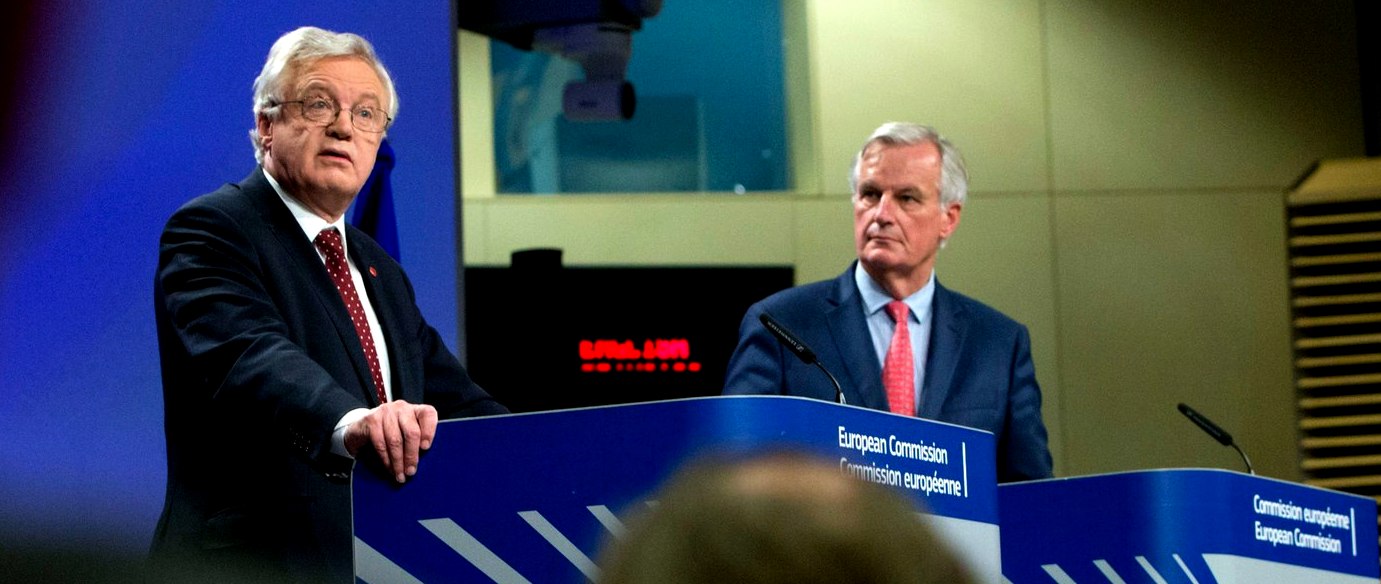
NEGOTIATORS:
Britain’s chief Brexit negotiator, David Davis, left, and his European Union counterpart, Michel Barnier, in Brussels,
November 2017.
Britain reportedly agreed in principle to a
divorce check of around $47 billion to $53 billion in the hope of securing the start of talks on a future trade arrangement with the 27 nations.
The unofficial offer, which covers commitments made while a member of the club, roughly doubles Britain’s initial $24 billion pledge, made in September, which fell flat with the European Union leadership.
For months, supporters of the withdrawal, known as Brexit, have rejected the idea of paying a substantial exit bill to honor commitments. Some, like the Euroskeptic lawmaker John Redwood has insisted that Britain owed nothing at all.
Yet, with time running out for Britain before it departs in March 2019, such pledges have collided, brutally, with reality.
Earlier this year, Britain’s chief Brexit negotiator, David Davis, told Parliament he could achieve a trade deal with the European Union that provided the “exact same benefits” as its current membership in the bloc’s single market and customs union. He has not repeated that promise recently, probably because European leaders have said repeatedly that Britain cannot possibly enjoy the benefits of membership if it is outside the bloc.
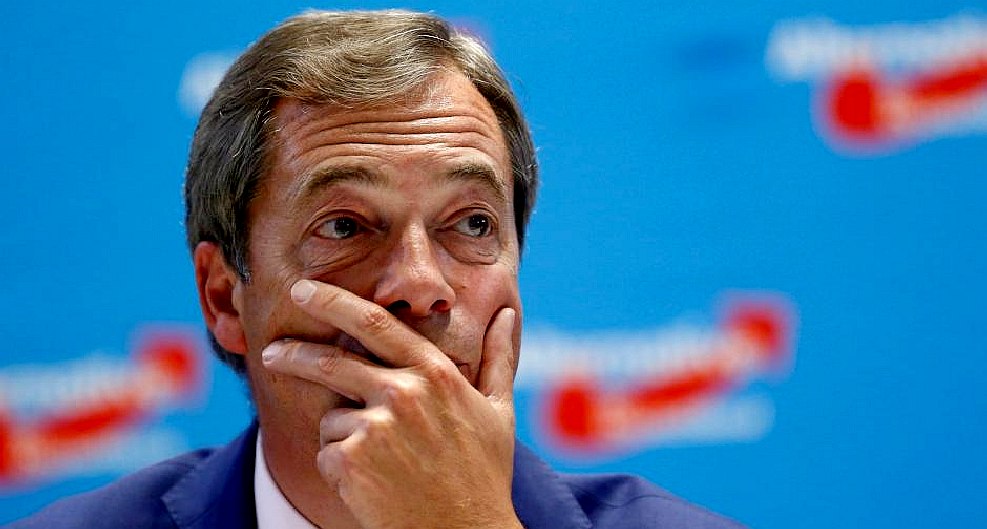
UKIP:
Veteran Brexit campaigner Nigel Farage said Britain should walk away from the talks rather than offer such huge sums.
“This is a complete sell-out that is not in our national interest,” said
Farage, a former leader of the UK Independence Party (UKIP) who played a big role in the 2016 referendum in which 52 percent of Britons voted to leave the EU.
“The British prime minister needs to say: ‘Look, either start to behave reasonably, either start to behave in a grown-up way, or ... we are walking away’,”
Farage, who remains a member of the European Parliament, told Reuters.
Many businesses and investors fear such an approach, leading to a “disorderly Brexit”, would spook financial markets, sow legal chaos and badly harm the British and EU economies by disrupting trade ties and cross-border supply chains.


MUSEUMS
JOURNAL 29-11-2017
MPs PROTEST EUROPEAN CAPITAL OF CULTURE EXCLUSION
Five UK areas have submitted bids for the title.
MPs representing the five areas that have submitted bids to be European Capital of Culture for 2023 have written to the European Commission president Jean-Claude Juncker, urging him to reconsider the applicants’ exclusion from the process.
Fifteen MPs including Rachel Reeves, the MP for Leeds West, and Stewart Hosie, the MP for Dundee East, wrote to Juncker on Monday encouraging him to allow the cities to participate in the competition.
The MPs said they “find it inexplicable that the European Union (EU) waited until after the bids from the United Kingdom had been submitted before ruling them all ineligible, when it has been aware of the UK’s decision since June 2016. Politics should not interfere with what is in many ways an event intended to bridge cultural and political divides.”
“We are writing to you, as president of the European Commission, to encourage you to reverse the discontinuation of the United Kingdom’s eligibility to be part of this great institution.”
The MPs added: “We politely remind you that the United Kingdom is still a member of the European Union, and that no decision has yet been made as to what a future relationship will look like.”
They also wrote to culture secretary Karen Bradley asking her “what we can do together to encourage a resolution to this situation with the European Commission in order to make sure that our cities are not denied this opportunity”.
Before the UK voted to leave the EU, the country was due to host a European Capital of Culture in 2023, sharing the accolade with Hungary. Bids were submitted by Dundee, Nottingham, Leeds, Milton Keynes and jointly by Belfast, Derry and Strabane.
But last week it was reported that UK cities would no longer be considered eligible, following the Brexit decision. Cities from non-EU countries have been awarded Capital of Culture status before. But if the countries are outside the EU, they must either be candidates to join the union, or in the European Economic Area or the European Free Trade Association.
After news of the EU’s position emerged, John Glen, the minister for arts, heritage and tourism tweeted: “Crazy decision by European Commission over Capital of Culture 2023. We’re leaving the EU - not Europe! My team at DCMS are speaking with the five cities right now on the way forward”.
Glen tweeted again on the issue yesterday, saying: “Grateful to the five UK candidates for European Capital of Culture 2023 for meeting me today. Very positive discussion and I'm looking forward to continuing to work with them to achieve their cultural ambitions.”
A spokeswoman for the Department for Digital, Cuture, Media and Sport said:
“We disagree with the European Commission's stance and are deeply disappointed that it has waited until after UK cities have submitted their final bids before communicating this new position to us. The prime minister has been clear that while we are leaving the EU, we are not leaving Europe and this has been welcomed by EU leaders.
“We want to continue working with our friends in Europe to promote the long-term economic development of our continent, which may include participating in cultural programmes. We remain committed to working with the five UK cities that have submitted bids to help them realise their cultural ambitions and we are in urgent discussions with the Commission on the matter.”
Fiona Hyslop, the Scottish cabinet secretary for culture, tourism and external affairs, said: “Late last year I wrote to the UK government to highlight the enormous benefits international cultural engagement can bring and to seek reassurances that the UK continues to participate in partnerships like the European Capital of Culture.
“It is now deeply concerning that the amount of time, effort and expense Dundee have put into scoping out their bid could be wasted thanks to the Brexit policy of the UK government.
“We are in urgent contact with the UK government and Dundee to understand the potential implications of this situation and to establish what action the UK government is going to take to address it.”
By Jonathan Knott
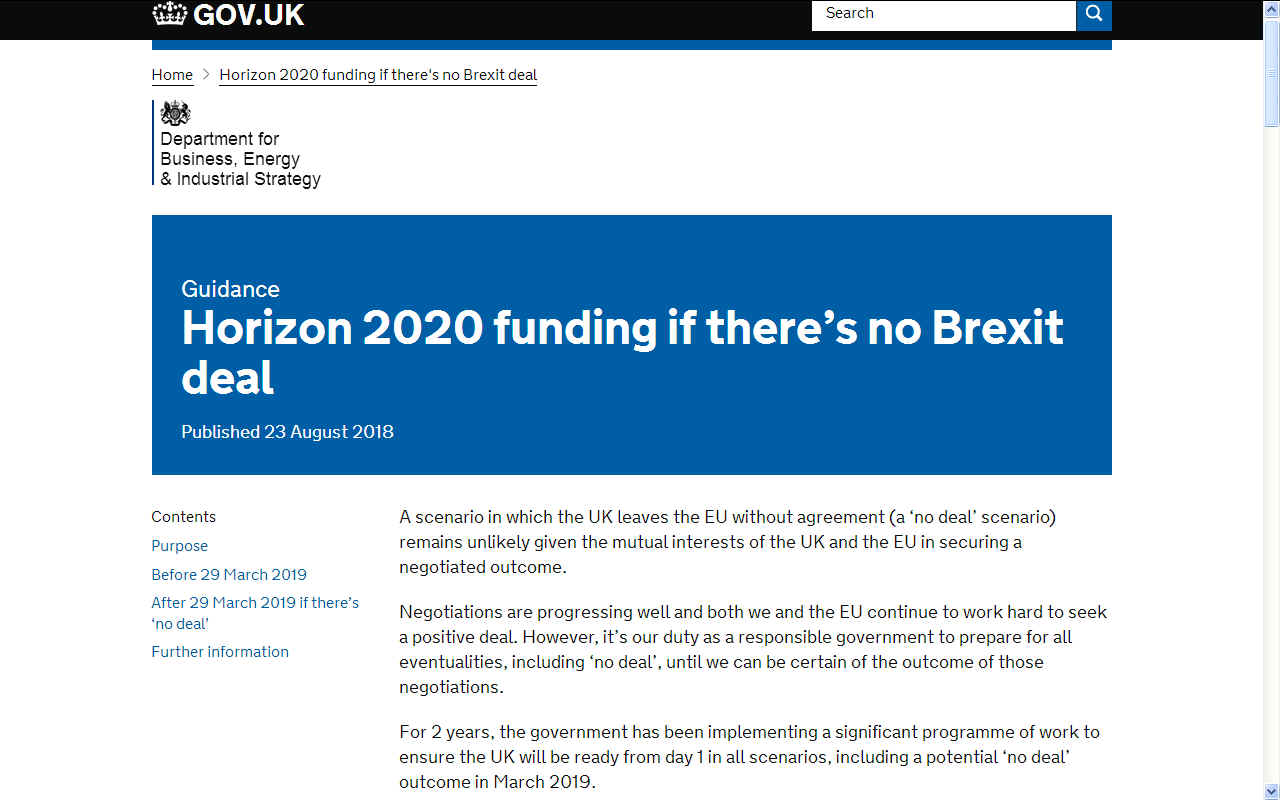
IT'S
OFFICIAL - Where speculation has prevented many British
concerns from applying for Horizon 2020 funding, let alone
considering building a consortium, the UK Government has
published their promise to underpin development costs for all
grants that are made prior to exit. In terms of international
and European innovation for cleaner seas, the Cleaner Ocean
Foundation hopes that the media hype that caused the rift will
do no further damage, in the hope that one day people of
Britain once again endorse the advantages of fuller
cooperation by agreement.
H2020
PROPOSALS AND UK GUARANTEES
It
is well reported that UK
councils say one thing and do another. Where officials in
any capacity in the UK appear to be cut from the same cloth -
if not quite so insincere,
can anyone be sure that the so-called Government guarantee
will be honored? Can anyone be sure to the point where they
would shell out substantial sums and time putting together a
consortium of European partners, when those same partners are
seeing what we are seeing. Those partners who would normally
welcome a UK partnership, might decide that the UK is too
unreliable and our Government too unstable to risk expenditure
- not least because we are withdrawing from the Union.
It must be that with calls for projects of three-year duration, that Europe will simply bin anything submitted by a UK lead.
Why? Because they know that with a UK lead (presumably with
protected IP and know-how) the EU will have paid for 66% of a project that any remaining partners
may not enjoy without agreement to that effect, so involving
the UK partner in any event.
One
way to invite EU investment for projects like SeaVax might be to secure Europe wide
patent cover and license SeaVax technology to the EU
for their use by member states for their marine litter and food
security calls. Should the EU feel that this is a way
forward to drive their marine litter and food security calls,
the Cleaner Ocean Foundation is able to grant sub-licences and
would welcome the opportunity to discuss possibilities.
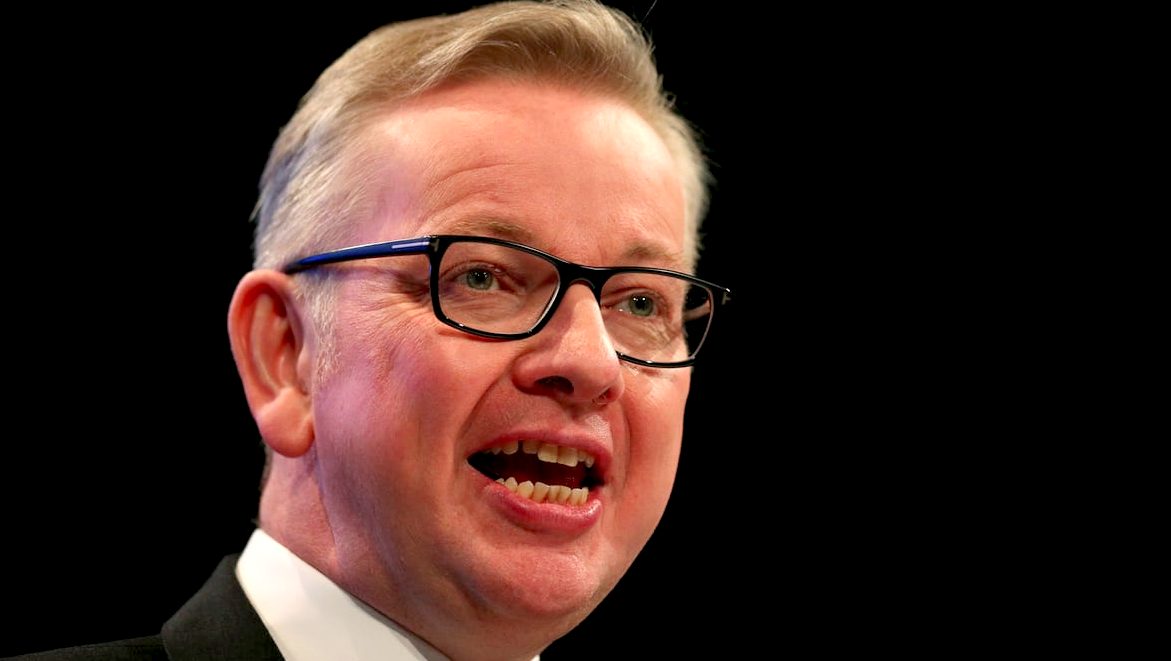
THE GUARDIAN
OCT 2017 - A deposit return scheme aimed at slashing plastic pollution has moved significantly closer after environment secretary Michael Gove said he would work with the industry to see how a scheme can be implemented in England.
Gove, speaking at the Conservative party conference in Manchester, announced a four-week call for views to inform how a deposit return scheme (DRS) would be designed. The government’s working group on the issue will also consider DRS for metal and glass containers.
Over eight million tonnes of plastic enter the oceans every year, with 80% coming from land. Plastic bottles are a major contributor; in June the Guardian revealed that a million are made every minute and the rate is rising quickly, with annual consumption forecast to top half a trillion by 2021.
At least a dozen nations already have DRS, in which a small deposit is paid when purchasing the bottle, which is then returned when the empty bottle is brought back.
In Germany and
Denmark, which have DRS schemes, more than 90% of bottles are returned. In England, just 57% of plastic bottles are recycled, mostly through streetside collection schemes. Gove was pressured this summer by opposition parties and NGOs to introduce a DRS in England, and Nicola Sturgeon announced in September that Scotland would introduce a DRS.
“We must protect our oceans and marine life from plastic waste if we are to be the first generation to leave our environment in a better state than we found it,” Gove said. “We want to hear people’s ideas on how we could make [a DRS] work in England.” In September, Gove said a plastic bottle DRS was a “great idea” but it was vital to devise a programme “that others can buy into”.
Gove noted the huge reduction in plastic bag use resulting from the 5p charge placed on single-use bags, and that the government was drawing up “one of the world’s toughest bans on plastic microbeads”. The DRS working group has been asked to report early in the new year.
“The continuous stream of disposable plastic bottles running into our oceans has been growing alarmingly,” said Greenpeace oceans campaigner Elena Polisano. “We urgently need solutions, and we think a DRS is probably the best way to raise the collection rate.”
Coca-Cola is one of the world’s biggest producers of plastic bottles and in February reversed its opposition to a DRS in Scotland. In July, the company announced it would use more recycled plastic in its bottles. However, on Monday Greenpeace revealed that Coca-Cola has increased its production of plastic bottles by a billion in the last year.
Louise Edge, oceans campaigner for Greenpeace, said:
“Coca-Cola talks the talk on sustainability but the astonishing rate at which it is pumping out single-use plastic bottles is still growing.”
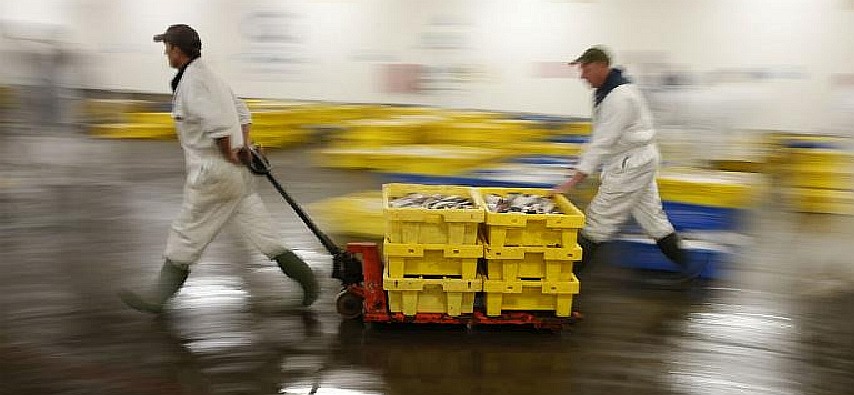
EURONEWS:
YOUR FISH AND EAT IT 9 NOV 2017
Grimsby, a seaside town in eastern England, voted overwhelmingly to quit the European Union.
More than two-thirds of people from the area backed leaving Brussels, making it one of the most Eurosceptic regions in Britain.
But now food chiefs from the town, a key player in the UK
fishing industry, have been lobbying the government to keep its free trade status with Europe.
Simon Dwyer, from Seafood Grimsby & Humber, told MPs there should be a special exemption for the region’s seafood industry, reported the Grimsby Telegraph.
Producers in the town import around 90 percent of the fish they process, making it vulnerable to the introduction of import tariffs, added the newspaper.
The revelation prompted mocking on Twitter, while Professor Brian Cox jokingly asked for an exemption for the whole of the UK.
But some believe the EU’s fishing laws led to the collapse of Grimsby’s fishing industry in the 1980s and was a key reason why 71.45 percent of voters backed quitting Brussels in the referendum last year.
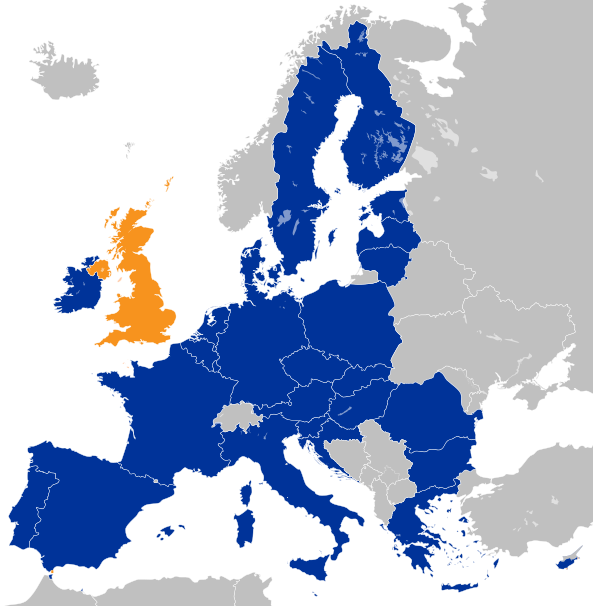
BBC
10
NOVEMBER 2017 - THERESA MAY WARNS BREXIT REBELS AS TALKS
RESUME
Theresa May has outlined plans to set the UK's departure date and time from the EU in law, warning she will not "tolerate" any attempt to block Brexit.
She said the EU Withdrawal Bill would be amended to formally commit to Brexit at 23:00 GMT on Friday 29 March 2019.
The bill will be scrutinised by MPs next week - but the PM warned against attempts to stop it or slow it down.
Mrs May was writing in the Daily Telegraph as a fresh round of Brexit negotiations are due to begin later.
The UK is due to leave the European Union after 2016's referendum in which 51.9% of voters backed Brexit.
The prime minister said the decision to put the specific time of Brexit "on the front page" of the Brexit bill showed the government was determined to see the process through.
"Let no-one doubt our determination or question our resolve, Brexit is happening," she wrote.
"It will be there in black and white on the front page of this historic piece of legislation: the United Kingdom will be leaving the EU on March 29, 2019 at 11pm GMT."
The draft legislation has already passed its second reading, and now faces several attempts to amend it at the next part of its parliamentary journey - the committee stage.
Mrs May said most people wanted politicians to "come together" to negotiate a good Brexit deal, adding that MPs "on all sides" should help scrutinise the bill.
She said the government would listen to MPs if they had ideas for improving the bill, but warned against attempts to halt the process.
"We will not tolerate attempts from any quarter to use the process of amendments to this Bill as a mechanism to try to block the democratic wishes of the British people by attempting to slow down or stop our departure from the European Union."
MPs have previously been told there have been 300 amendments and 54 new clauses proposed.
The PM said the "historic" bill was "fundamental to delivering a smooth and orderly Brexit" and would give "the greatest possible clarity and certainty for all businesses and families across the country".
Labour MP and remain campaigner, Chuka Umunna, said many experts believed the March 2019 leaving date did not give much time for negotiations.
He told BBC Radio 5 live: "Lord Bridges said he could not see the government being able to negotiate the transition arrangement, like the bridge to us leaving, and the divorce bill, by 2019. So we may actually need more time."
Lord Kerr, the former diplomat who helped draft Article 50 of the Lisbon Treaty - the mechanism the UK has used to exit the EU - said putting the Brexit date on the bill did not mean the withdrawal process was irreversible.
The cross-bench peer told BBC Radio 4's Today programme that decisions such as these were being made in
Westminster, and "had nothing to do with the treaty, and they have nothing to do with the views of our partners in Brussels".
But the Conservative MP and leave campaigner, Peter Bone, welcomed the decision to enshrine the leaving date in law, saying it was a "really big, important step".
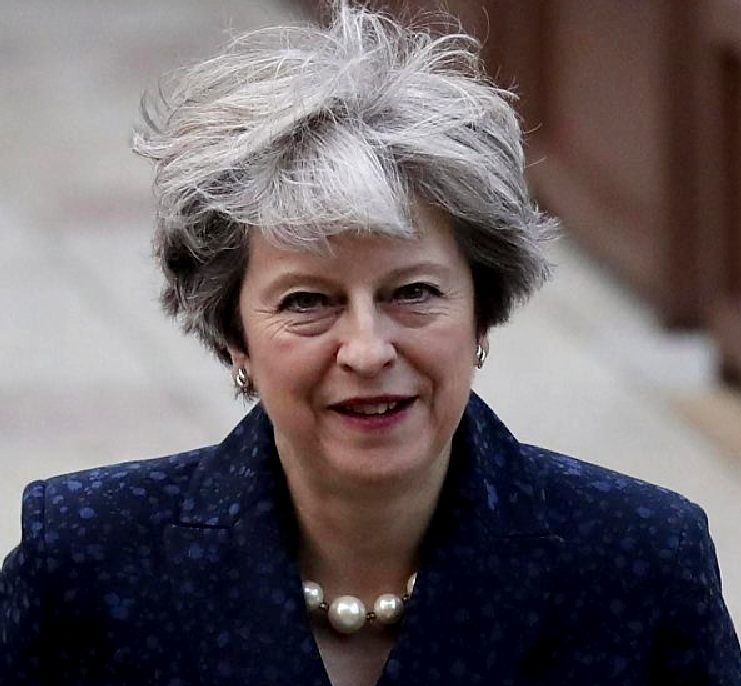
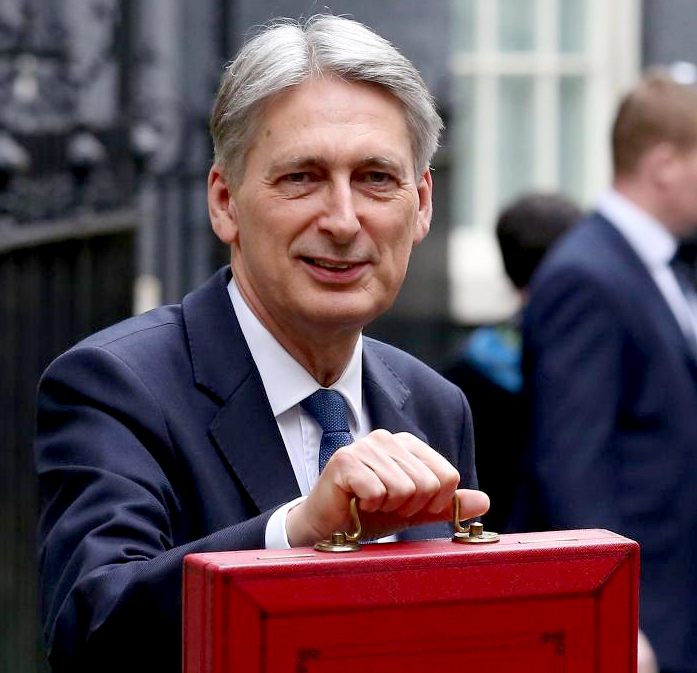
THE
SUN 10
NOV 2017: Theresa May has been branded economically illiterate by Treasury insiders as relations with the Chancellor plunge to new depths.
Sources from within Philip Hammond’s team at No.11 have hit out at the PM’s refusal to approve a change to planning laws to end the housing crisis.
They claim that however much money is thrown at the problem, only a relaxation of the planning rules will trigger a housebuilding boom.
In today’s column by James Forsyth one source says: “Philip Hammond has explained the economic reality to her.
“And she just doesn’t want to listen.”
Sources close to the PM insist the pair are sharing details about the Budget and dismissed reports of a breakdown in relations.
But others claim relations between Philip Hammond and Theresa May are now as bad as Tony Blair and Gordon Brown during the Labour government.
In Whitehall, insiders claim the Treasury is trying to shield the Budget from Number 10 . The Sun last week revealed the PM and Chancellor clashed at a story Budget meeting.
They met in No.10 to plan big measures in the Chancellor’s annual economic blueprint on November 22.
The Budget is the last big chance this year to reboot Theresa May’s premiership. But one MP admitted the party simply needed to “get through” the Budget without any gaffes.
He told the Sun: “We need a B plus rather than an A Star.”
BREXIT
ON WIKIPEDIA
Brexit (/ˈbrɛksɪt/ or /ˈbrɛɡzɪt/) is the popular term for the prospective withdrawal of the United Kingdom (UK) from the European Union (EU).
In a referendum on 23 June 2016, 51.9% of the participating UK electorate (the turnout was 72.2% of the electorate) voted to leave the EU. On 29 March 2017, the British government invoked Article 50 of the Treaty on the European Union. The UK is thus on course to leave the EU on 29 March 2019.
Prime Minister Theresa May announced that the UK would not seek permanent membership of the single market or the customs union after leaving the EU and promised to repeal the European Communities Act of 1972 and incorporate existing European Union law into UK domestic law. A new government department, the Department for Exiting the European Union (DExEU), was created in July 2016, with Eurosceptic David Davis appointed its first Secretary of State. Negotiations with the EU officially started in June 2017.
The UK joined the European Communities (EC) in 1973, with membership confirmed by a referendum in 1975. In the 1970s and 1980s, withdrawal from the EC was advocated mainly by Labour Party members and trade union figures. From the 1990s, the main advocates of withdrawal were the newly founded UK Independence Party (UKIP) and an increasing number of Eurosceptic Conservative Party members.
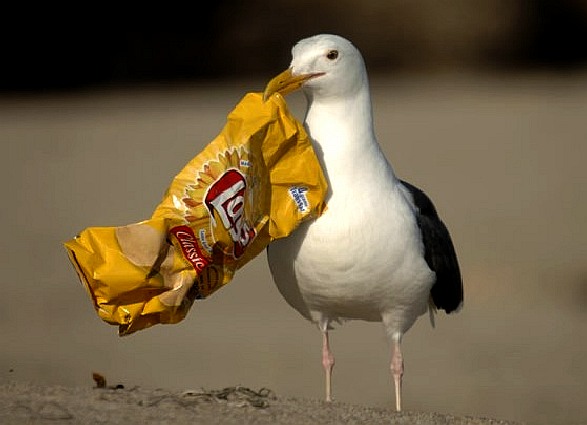
SINGLE
USE PLASTIC: Not doing anything positive to combat marine
litter is consigning wildlife such as this seagull to a
painful death. Beach cleaning is a positive move in the right
direction as is bottle banks for plastic. Another way of
working to protect the
environment might be awareness campaigns such as our
Miss/Mister Ocean tour linked with our Virtual
Ocean 3D interactive experience and now a 2D phone game
that will be free to download when available.
HOW
DID WE GET INTO THIS MESS ?
In 2012 Prime Minister
David Cameron rejected calls for a referendum on the UK's EU membership, but suggested the possibility of a future referendum to gauge public support. According to the BBC, "The prime minister acknowledged the need to ensure the UK's position within the European Union had 'the full-hearted support of the British people' but they needed to show 'tactical and strategic patience'."
Under pressure from many of his MPs and from the rise of UKIP, in January 2013, Cameron announced that a Conservative government would hold an in–out referendum on EU membership before the end of 2017, on a renegotiated package, if elected in 2015.
The Conservative Party unexpectedly won the 2015 general election with a majority. Soon afterwards the European Union Referendum Act 2015 was introduced into Parliament to enable the referendum. Cameron favoured remaining in a reformed European Union, and sought to renegotiate on four key points: protection of the single market for non-eurozone countries, reduction of "red tape", exempting Britain from "ever-closer union", and restricting EU immigration.
In December 2015 opinion polls showed a clear majority in favour of remaining in the EU, although support would drop if David Cameron did not negotiate adequate safeguards for non-eurozone member states and restriction on benefits for EU citizens.
The outcome of the renegotiations was announced in February 2016. Some limits to in-work benefits for new EU immigrants were agreed, but before they could be applied, a country such as the UK would have to get permission from the European Commission and then from the European Council.
In a speech to the House of Commons on 22 February 2016, Cameron announced a referendum date of 23 June 2016, and commented on the renegotiation settlement. He spoke of an intention to trigger the Article 50 process immediately following a leave vote, and of the "two-year time period to negotiate the arrangements for exit."
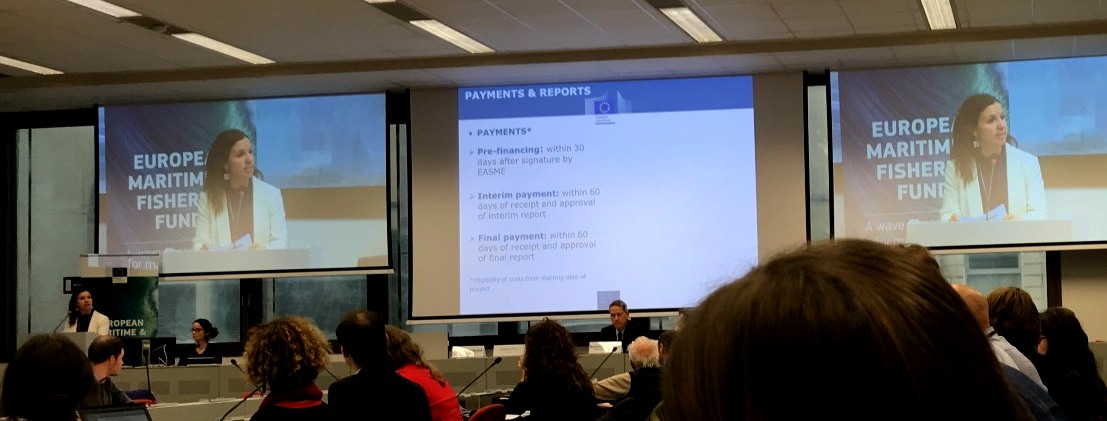
THE
FOG: Victoria Beaz Hidalgo (seen in the picture
above) spoke about some of the pitfalls
that applicants fall foul of when applying for funding at the
EMFF information event in Brussels on November 9 2017 - as to how
applicants for funding might tick the right boxes, but she
(and her colleagues) failed to address the Brexit
brake, leading to a question from the floor from our delegate
- where the Cleaner Ocean Foundation is looking to secure
funding for marine litter cleaning, or food security, which
amounts to the same thing all under the heading of blue
growth. The present uncertainty over Brexit is creating a
cloud of vagueness that is likely to put research back many
years if the those leading the negotiations do not agree on a
way to compromise - that may allow important research to
continue.
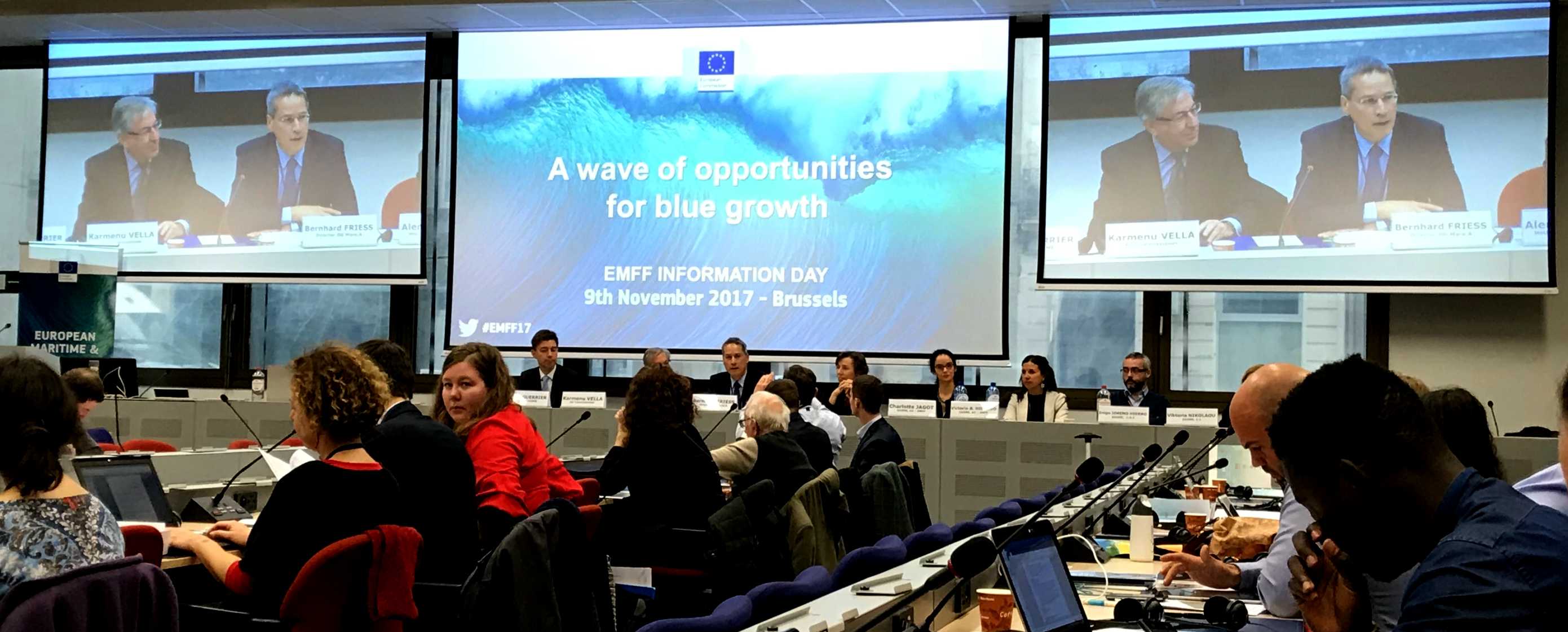
QUESTIONS
UNANSWERED: Bernhard Friess chaired the question and
answer section before the lunch break. Another question posed
by our man in Brussels was to do with down scoring as a result
of a lack of trading track record. This question remains
unanswered, we presume because it is awkward and may put off a
number of potential applicants, where for the EU it is the
numbers game and some kind of a scatter-gun approach. We do
though live in hope.
BREXIT
ON THE BBC
We're now halfway between the Brexit referendum and the day the UK is supposed to leave the EU, and the entire process seems to be clouded in confusion.
Don't take my word for it. I've spent the last three weeks talking to a variety of people, from Irish thoroughbred breeders to chief executives of construction companies, from nuclear scientists to taxi drivers. And everyone wants to know where on earth all this is heading.
I've seen it argued that Leavers and Remainers find it difficult to have a constructive debate because the Leave side tend to focus on broad political themes (Take Back Control, anyone?) while the Remain side focus on the detail.
That's why some advocates of Remain still have difficulty accepting the fact that a big political decision was made in the referendum.
At the same time a government that has committed itself to Brexit, but is divided about what that actually means, is trying to master the detail in record time.
And if there's one thing about Brexit that does become clearer every week, it is that this is a process of unprecedented complexity. Like unstitching a blanket, or unbaking a cake: you can choose your own simile, but the inference is clear.
No advanced industrial economy has ever tried to do anything quite like this before - extricating itself in an astonishingly short space of time from more than 40 years of shared sovereignty and close economic co-ordination with its nearest neighbours..
No wonder we're still a wee bit perplexed. Explaining Brexit is a bit like stapling jelly.
But here, slightly at random and in no particular order, are a few things that emerged from our series, which may be worth keeping an eye on.
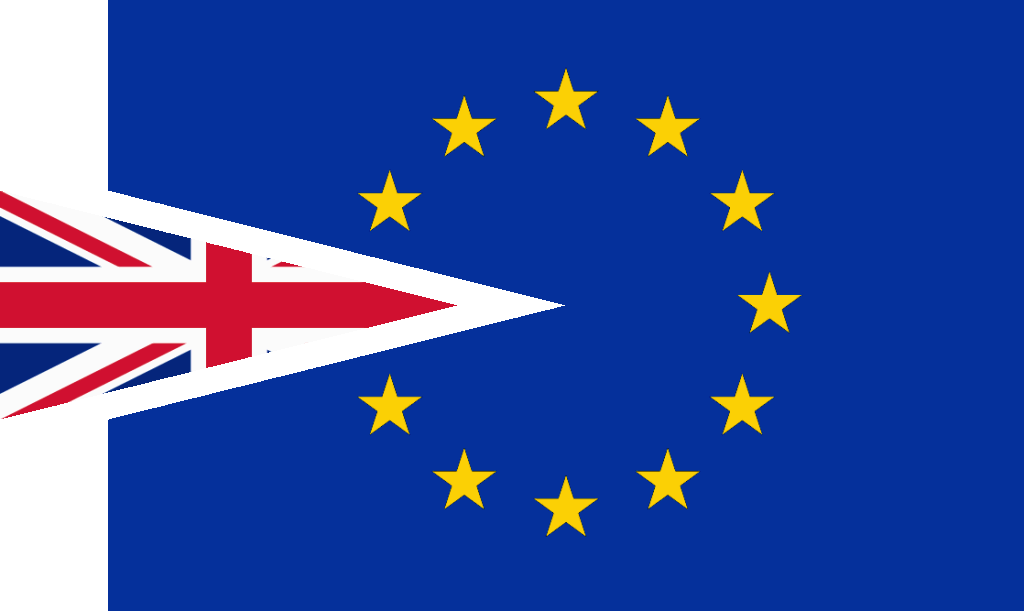
1
DIRECT EFFECT
If a deal is to emerge soon on the issue of citizens' rights (for EU citizens here in the UK in particular) then the notion of "direct effect" is likely to loom large.
It is a really important principle of the European Court of Justice, because it means individuals can invoke European law before national courts.
[COMMENT] You should try that in the UK
where Article 1 and 13 (your right to an effective remedy) are
excluded from the Human
Rights Act 1998, hence domestic legislation is very much
aligned with the present British attempts to distance
themselves from inconvenient statute, even where they helped
to draft it after World
War Two.
In this case, the Brexit withdrawal agreement (with European law enshrined within it) could be written directly into UK law rather than relying on a separate piece of UK legislation to implement it.
The EU thought that the UK had conceded this point; if that turns out not to be so, it will cause problems.
2 IRELAND
It's not just about the border, and the effect on Northern Ireland, critically important though that is.
A total of 80% of Irish exports go to or through the UK, which is also critical for Irish
energy supplies, and no other country outside the UK has nearly as much at stake in the Brexit debate as the Republic of Ireland.
"There is hardly any area of Irish life that won't be affected in one way or another," says Tony Connelly, author of the book Brexit and Ireland.
That means Dublin needs a good deal with the UK after Brexit. But it doesn't mean
Ireland won't play tough.
In the Brexit negotiations it is sticking with the mantra of the unity of the EU27, and exasperation with UK politics is mounting.
3 ROBOTS
Anna Wallace, the director of political relations at the professional services firm PricewaterhouseCoopers, told the story of a manufacturing company in Wales that has decided to replace EU migrant workers with machines, rather than with a locally hired workforce.
"They knew they were probably going to do that in five years' time," she says. "But good businesses are now thinking about all of those things together."
It is a reminder that Brexit is only one part of a much larger economic debate, as another technological revolution looms large.
Automation would be changing the working lives of many people come what may (in fact, it already is). But the effect of Brexit will probably speed up things.
The good thing about change? It always brings opportunity as well as risk.
4 THE LABOUR MARKET
The end of the free movement of people from the EU could well lead to some liberalisation of UK immigration policy for the rest of the world.
That may not come as a surprise to many economists who deal with immigration issues, but it may not have been what many Leave supporters thought they were voting for.
The UK will still need immigrant labour to keep its economy moving.
Even the pressure group Migration Watch advocates the creation of new schemes for seasonal agricultural workers from the EU, and for young people between the ages of 18 and 30 to work in the UK for up to two years.
But immigration policy isn't just about the UK choosing whom it wants. They have to want to come to the UK too. The rest of the world beyond Europe may have to fill some gaps in the market.
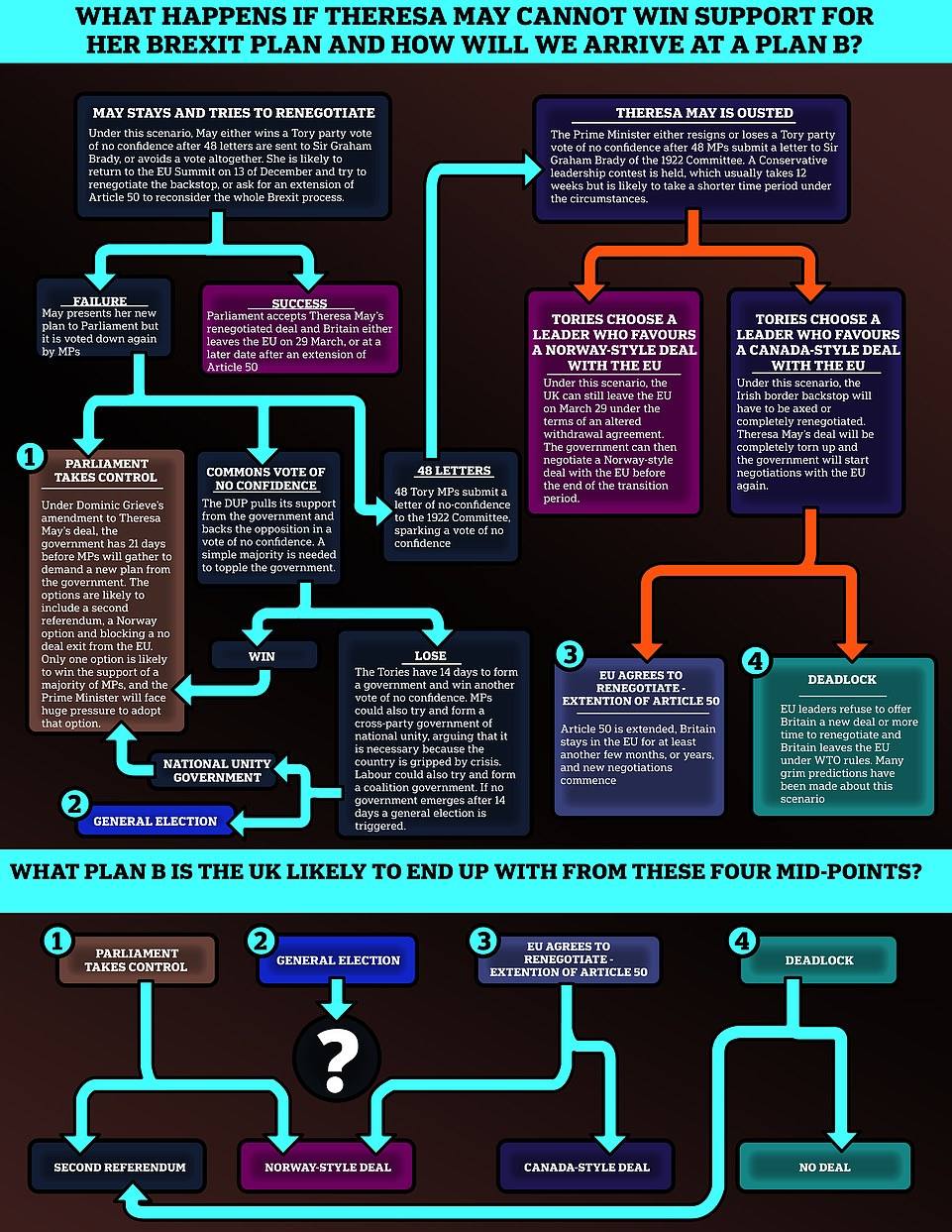
5 JET
The Joint European Torus in Oxfordshire can lay convincing claim to be the greatest scientific experiment in the UK. The long-term aim is to produce an unlimited supply of clean energy through nuclear fusion.
But Jet is run under the auspices of Euratom, the European Atomic Energy Community. And alongside the EU, we're leaving Euratom too.
The trouble is that funding for Jet runs out at the end of 2018. And until we know the future relationship between Euratom and the UK after Brexit, no one can say for certain that funding will be extended.
Surely, you cry, they won't just pull the giant Torus plug?
"I work in fusion research so by definition I think I'm an optimist," says Ian Chapman, the chief executive of the UK Atomic Energy Authority.
"But everybody is anxious, and everybody wants a resolution to this as quickly as possible."
6 FOG AHEAD
You probably know this one already, but it is worth repeating. When it comes to Brexit, no one has any idea what is going to happen next.
"I've been following British politics professionally for almost 50 years," says the pollster Peter Kellner.
"Never before have I been so uncertain as to where British politics has been heading.
"We're looking at a mountain ahead of us shrouded in fog. We can't see the pass and we don't know what's on the other side."
The battle for Brexit seems to have been around forever, but it may be that the critical phase is only just beginning.
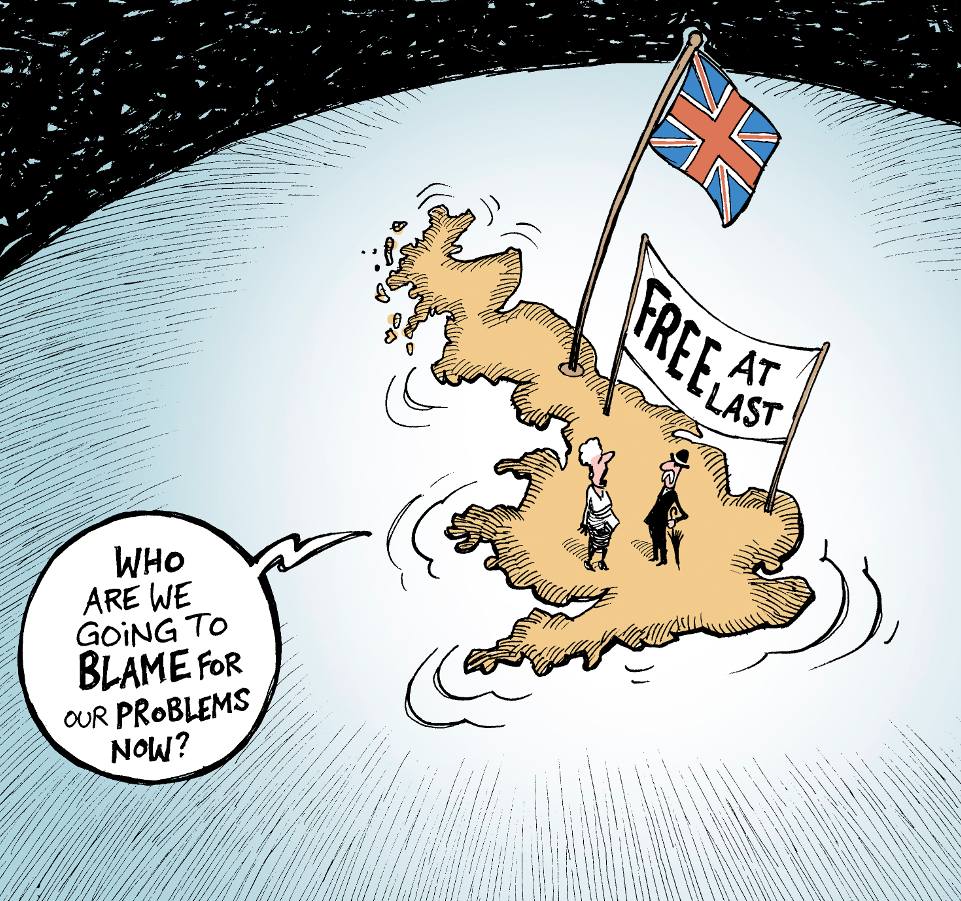
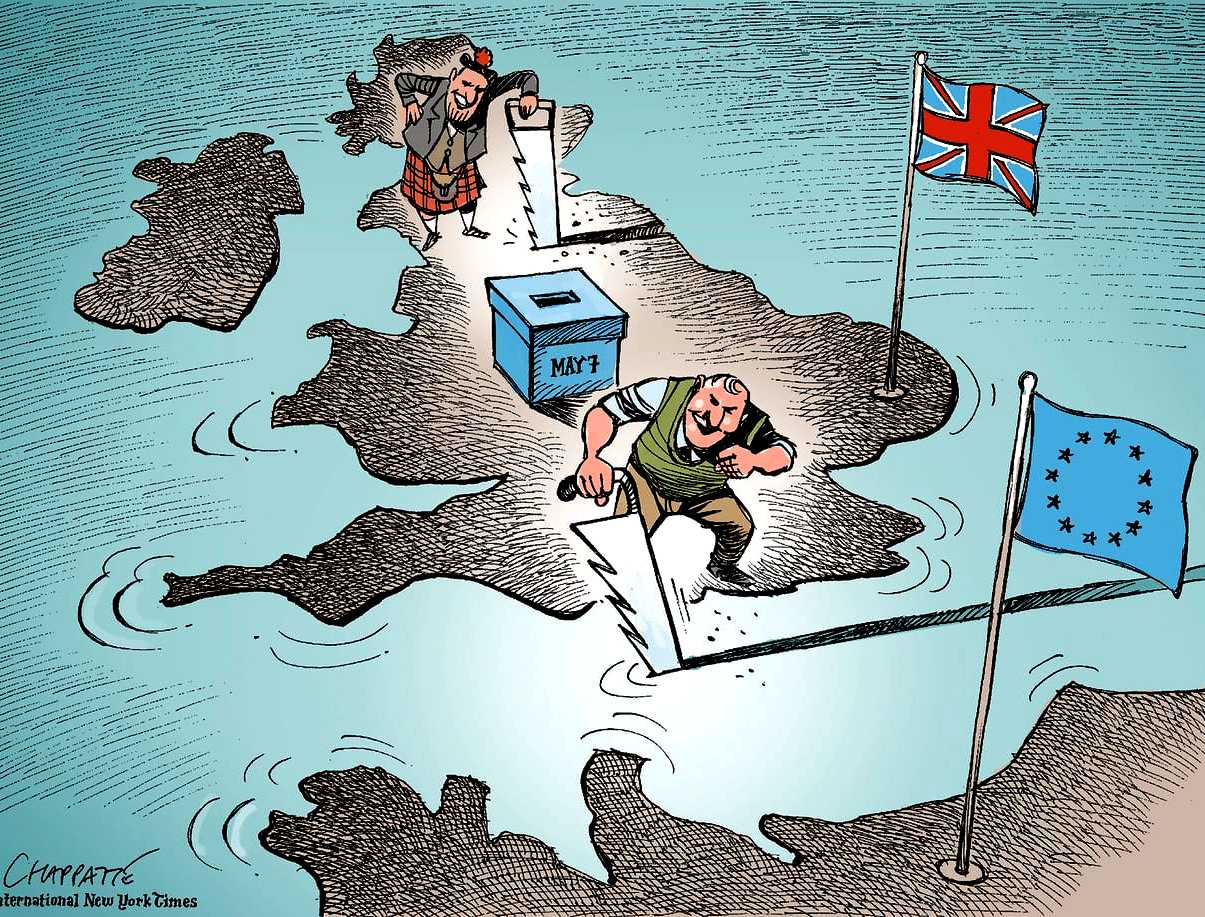
LIFE RAFT:
No more gripes about the EU from the UK might be a good thing.
It's looking good for Scotland who may decide to remain in the
EU and severe ties with the UK. Incredible in a world that is
shrinking as technology advances us closer to our neighbours
and so becoming more of a global community, that any player
would wish to step back into the dark ages. The UK are sending
themselves to Coventry, simply because David Cameron threw all
his toys out of the pram in earlier negotiations - not realizing
that he was opening the UK to die hard nationalists waiting in
the wings to fuse immigration issues with sovereignty.
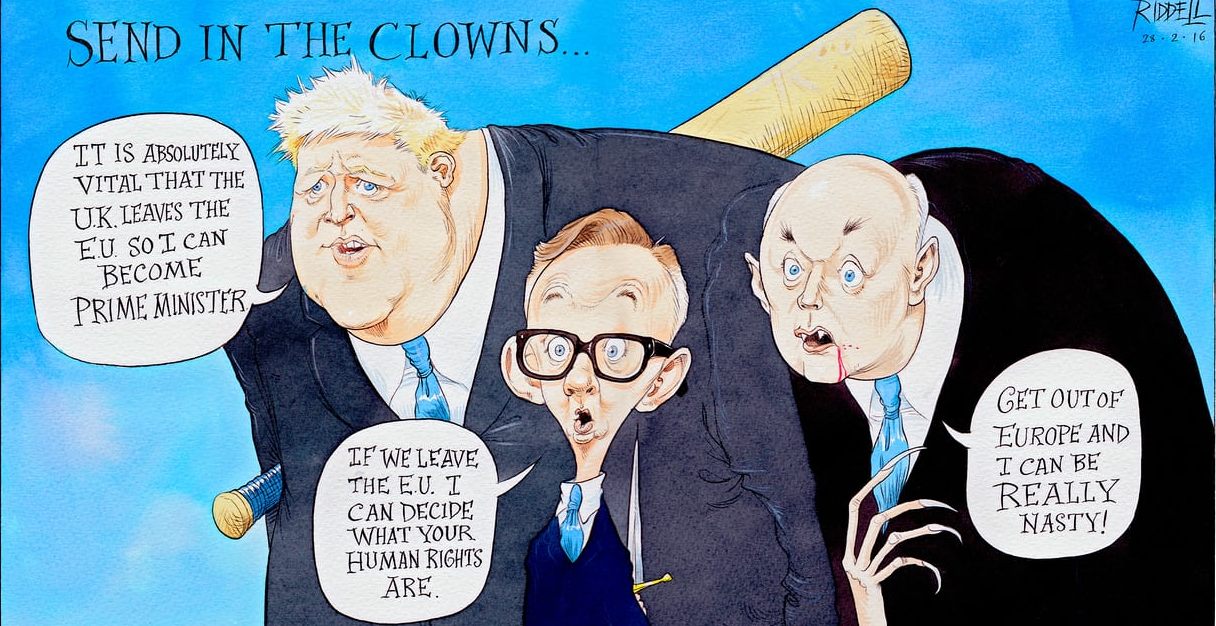
BORIS
GOING FOR GOLD: A referendum promised by an insecure leader in an attempt to keep his critics quiet in the run up to the last election, this showdown has been coming for
years with anti-human-rights campaigners trying to all but
eliminate the inconvenience of every persons basic right to be
treated like a human being. Now as the “bastards” who made John Major’s life a misery cheer on from their bath chairs, today’s rightwing clowns are having their moment in the limelight.
Bloodsucking civil servants will be doing all they can to
write out as much of the European
Convention as they can, knowing full-well that in the end
a more civilized society is at the end of the road - where the
writing on the wall in sustainability - an invisible
intellectual barrier that limits the harm we might invoke on
natural resources before that harm comes back to create food
shortages and civil unrest. These cartoonists are saying
it all.
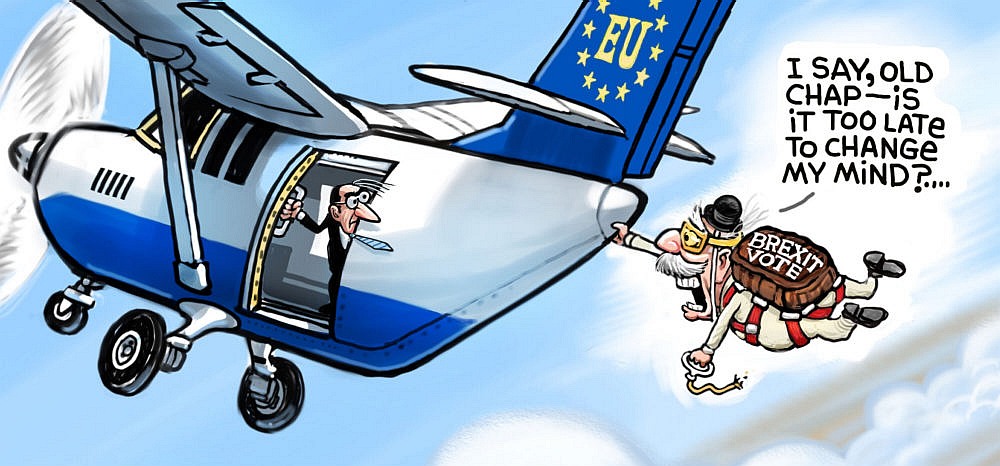
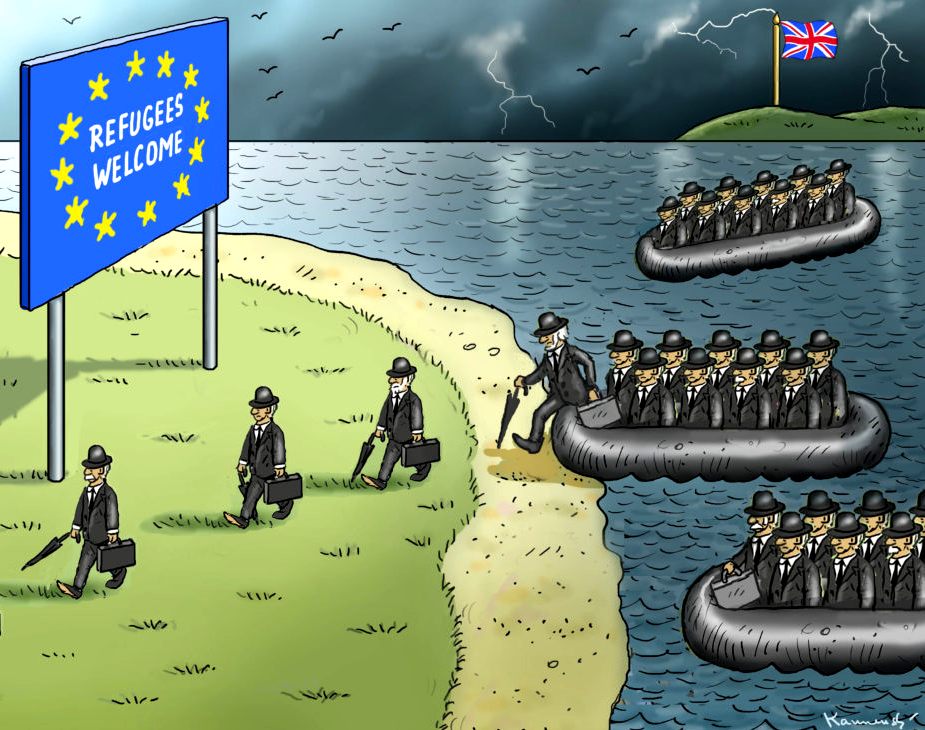
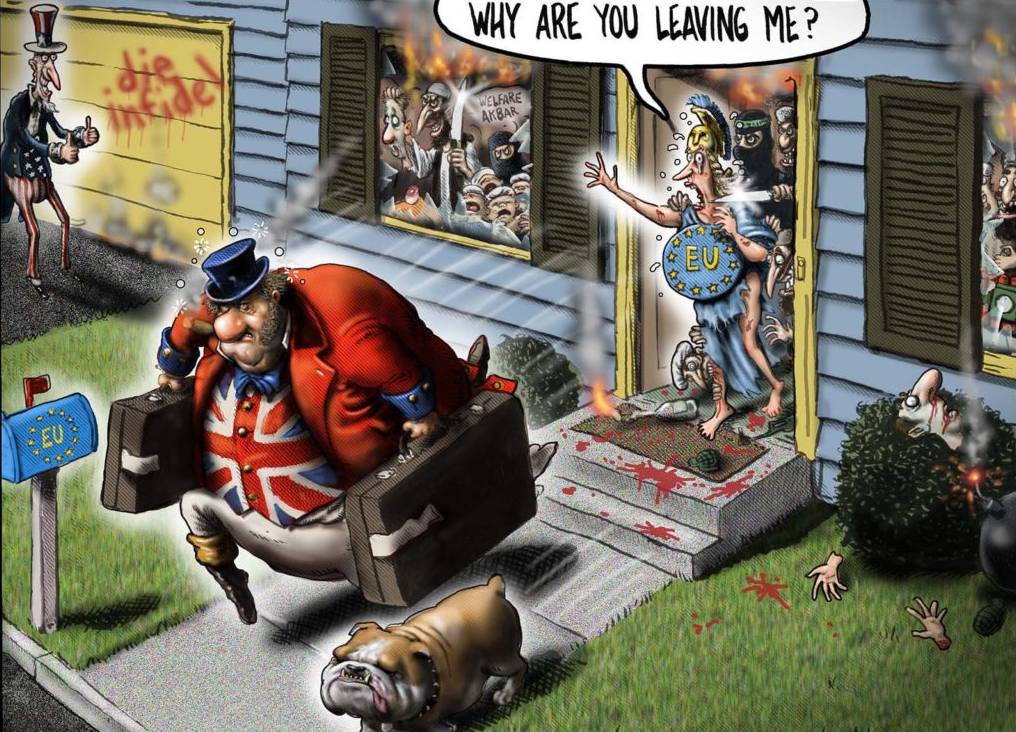
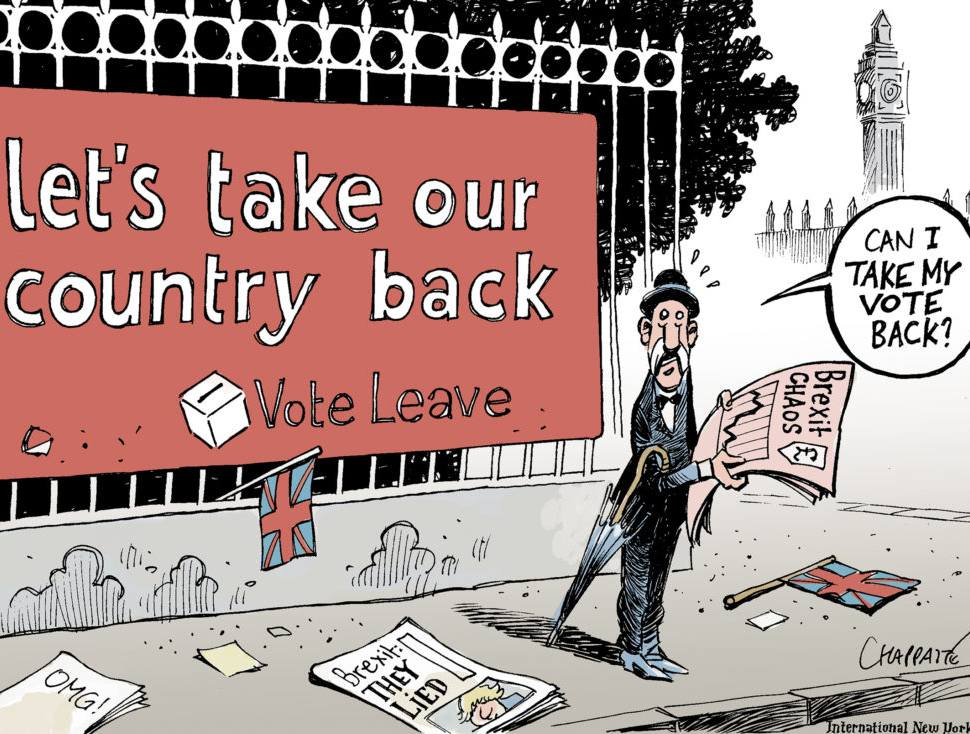
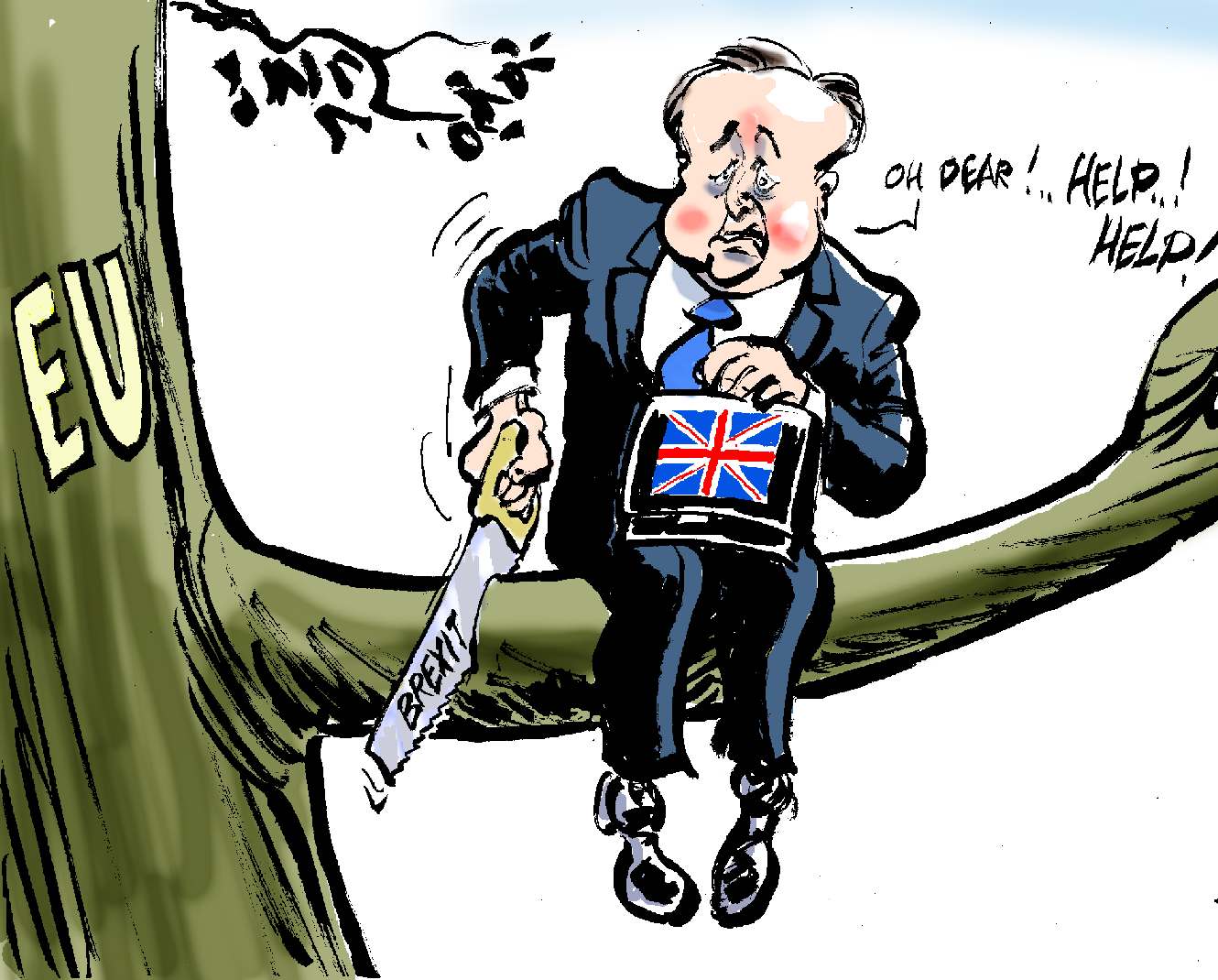
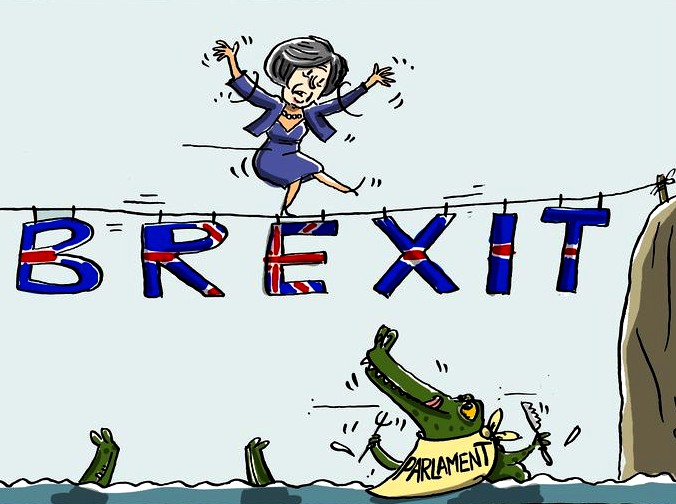
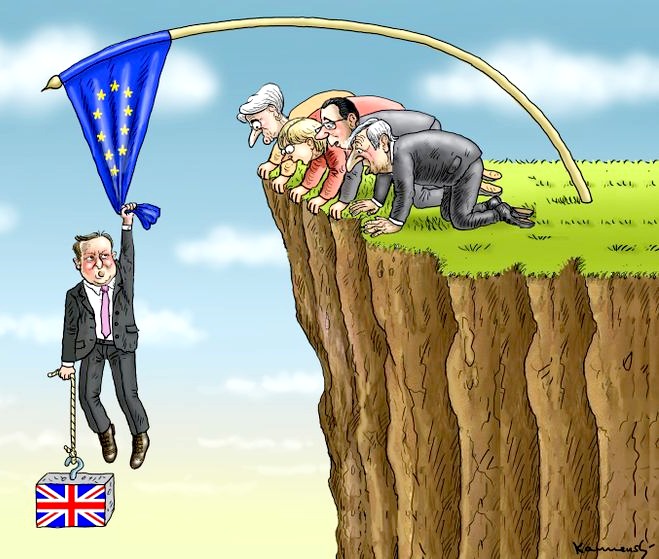
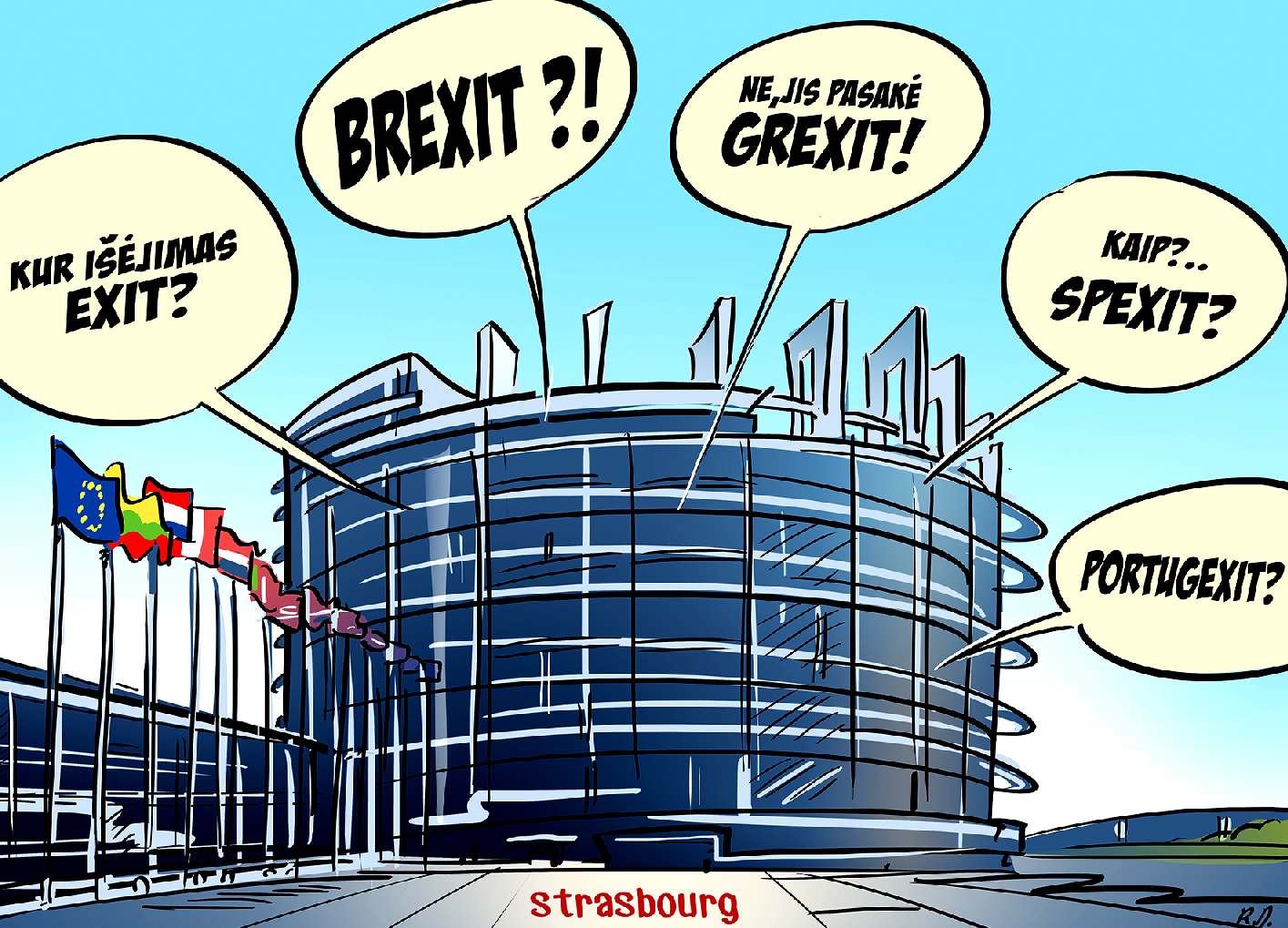
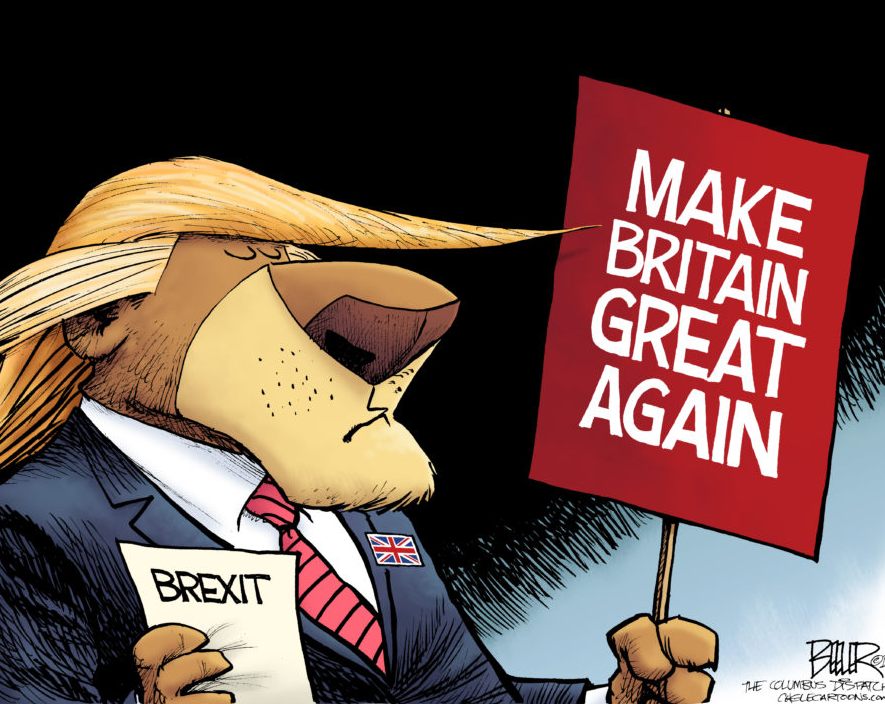
LAUGHTER:
The UK referendum has provoked as much debate abroad as at home – and as many
laughs, but has not triggered a mass exodus for the obvious
reason that being a member of the EU has many advantages.
Many
media articles agree that this was a referendum promised by an insecure leader in an attempt to keep his critics quiet in the run up to the last election, this showdown has been coming for years. Now as the “bastards” who made John Major’s life a misery cheer on from their bath chairs, today’s rightwing clowns are having their moment in the limelight.
CARTOONS The
above collection of cartoons from around the world more or
less sums up how the UK is perceived for staging this
particular political tantrum. However you may view the
situation, one thing at least is that a process of review
could be established.
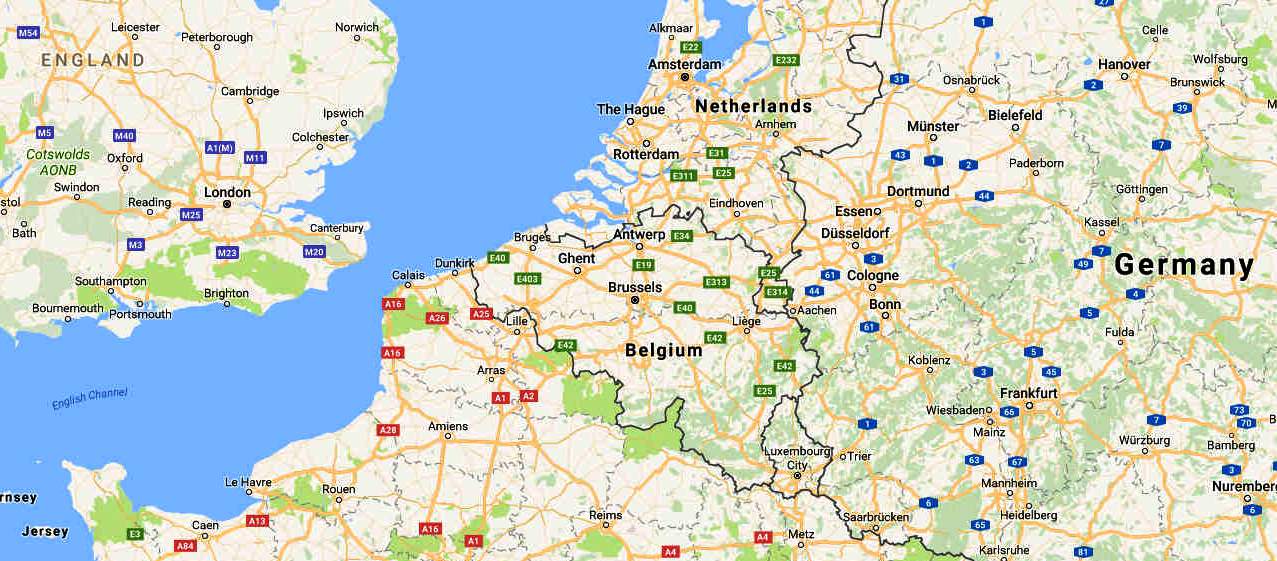
BRUSSELS -
The City of Brussels is the largest municipality and historical centre of the Brussels-Capital Region, and the de jure capital of Belgium.
Brussels is also home to the European Parliament where any
agreements would be signed by the EU.
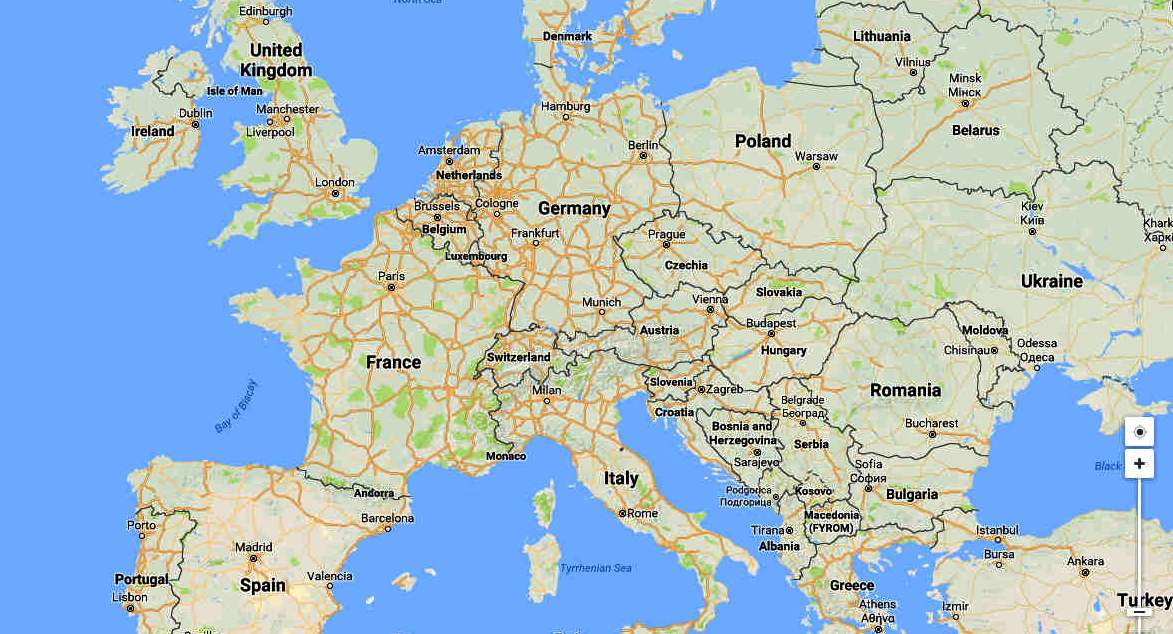
BELGIUM -
The Kingdom of Belgium, is a sovereign state in Western Europe bordered by France, the Netherlands, Germany, Luxembourg, and the North Sea. It is a small, densely populated country which covers an area of 30,528 square kilometres (11,787 sq mi) and has a population of about 11 million people. Belgium is home to two main linguistic groups: the Dutch-speaking, mostly Flemish community, which constitutes about 59 percent of the population, and the French-speaking, mostly Walloon population, which comprises about 40 percent of all Belgians. Additionally, there is a small ~1 percent group of German speakers who live in the East Cantons.
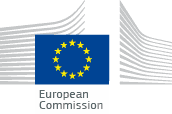
LINKS
& REFERENCE
https://www.itv.com/news/utv/2023-02-07/brexit-was-a-colossal-mistake-former-pm-sir-john-major-tells-ni-committee
https://www.express.co.uk/news/uk/1045303/Brexit-news-UK-fishing-video-EU-bully-Brexit-punish-British-fishing-Theresa-May
http://www.europarl.europa.eu/news/en/headlines/priorities/brexit
https://www.dailymail.co.uk/news/article-6490985/Theresa-heads-Brussels-TODAY-ten-minutes-pitch-new-Brexit-deal.html
https://www.reuters.com/article/us-britain-eu-brexiteers/brexit-campaigners-accuse-may-of-selling-uk-short-over-divorce-bill-idUSKBN1DT1QH
http://www.bbc.com/news/uk-politics-42161346
http://www.euronews.com/2017/11/09/brexit-backing-british-town-now-wants-to-keep-free-trade-with-eu
http://www.bbc.co.uk/news/uk-politics-41936428
https://globecartoon.wordpress.com/2016/06/23/after-a-brexit/
https://www.theguardian.com/society/2016/mar/20/brexit-silly-walk-best-political-cartoons-eu-europe-referendum
https://www.politico.eu/interactive/brexit-european-union-referendum-commission-david-cameron-leave-cartoons-draw-brexit-divorce/
http://www.henry4school.fr/UK/history/brexit.htm
https://www.cartoonmovement.com/cartoon/27582
https://www.cartoonmovement.com/cartoon/36728
http://ukcitizenshipsupport.com/uk/brexit-what-will-happen-europeans-living-uk/
http://tbivision.com/news/2016/06/brexit-mean-kids-tv/614042/
http://www.patheos.com/blogs/danpeterson/2016/06/brexit.html
https://en.wikipedia.org/wiki/Brexit
http://www.bbc.co.uk/news/uk-politics-41915195
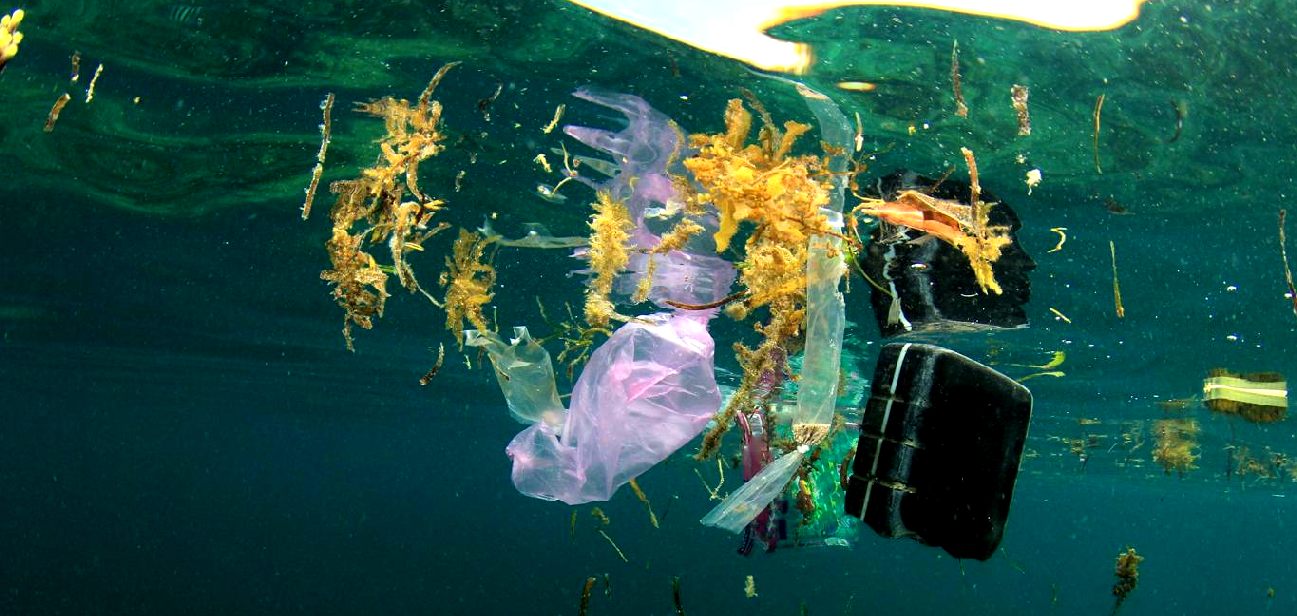
THE
OCEAN DOES NOT LIE: Politicians can spin themselves out of almost anything
and are ultimately replaced by another spin-doctor who may for a while follow
their ideals but will soon become entrenched in political brinkmanship rather
than dealing with urgent matters looming and presently out of control such as
marine litter.
When you consider the size of the Mediterranean Sea,
€14 million
euros may not seem like much to be able to tackle the problem
of marine litter and this has been the view of the assessors,
or rather applications in respect of Horizon 2020 calls have
not been funded because of budgetary constraints, though
considered to have merit. What is likely to happen as a result
of budget shortfalls and the present difficulties over Brexit
is that organizations within the UK may decide to relocate
their base of operations, or alternatively, look elsewhere for
funding or both. This might be simply to extricate themselves
from the present quagmire, doing what they can to stay clear
of politics.
According to the United
Nations Department of Economic and Social Affairs (UN-DESA
2009), the world population is expected to grow from the
present 6.8 billion people to about 9 billion by 2050, mostly in developing countries (5.6–7.9 billion).
Fisheries around the world provide significant food catches
that are dwindling as a result of over-fishing and marine
pollution. By tackling marine pollution, the oceans stand a
better chance of regeneration, giving fish a healthier
environment in which to flourish.
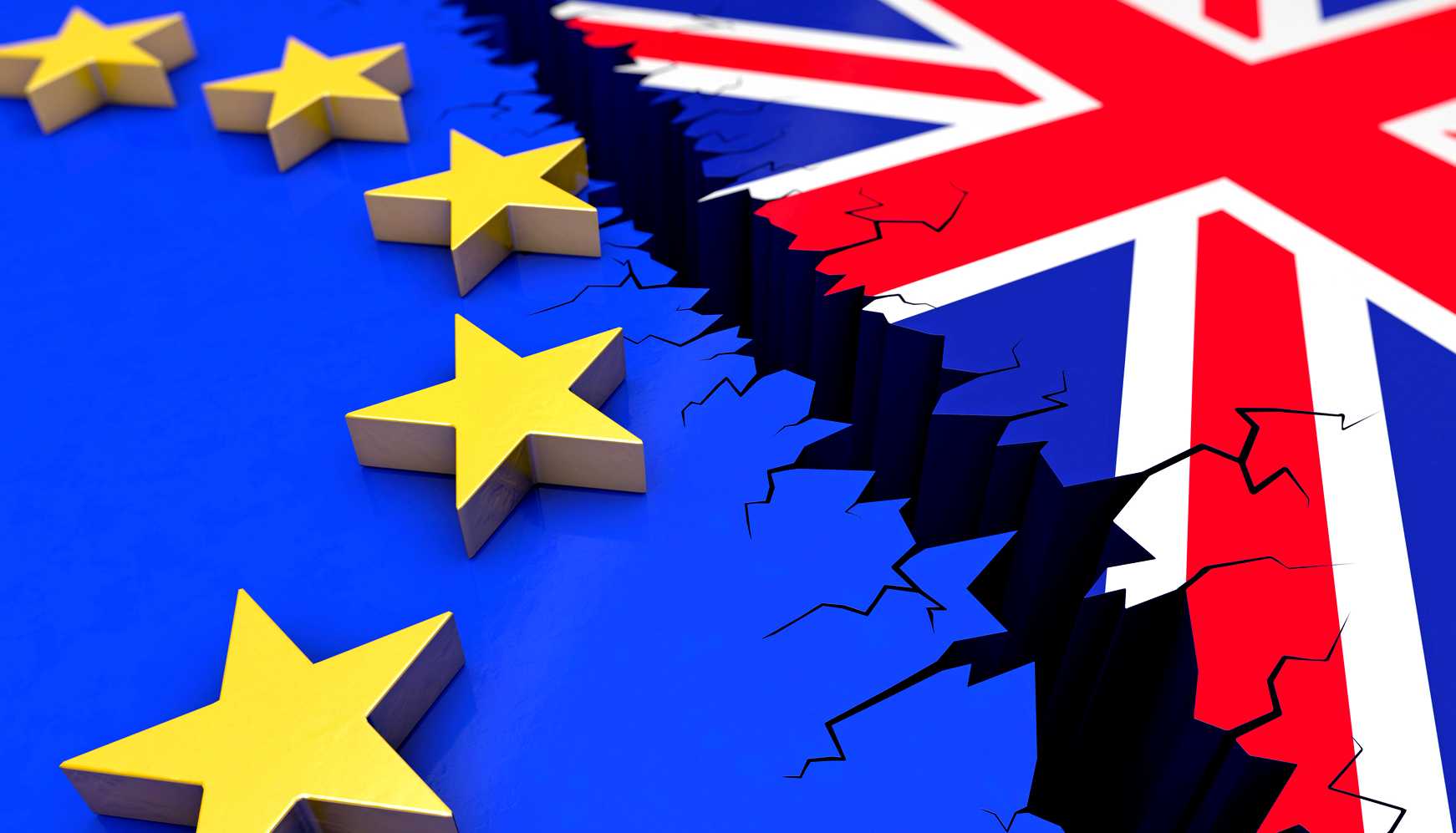
This
website is provided on a free basis as a public information
service. copyright © Cleaner
Oceans Foundation Ltd (COFL) (Company No: 4674774)
2023. Solar
Studios, BN271RF, United Kingdom.
COFL
is a charity without share capital. The names AmphiMax™,
RiverVax™
and SeaVax™
are trade names used under license by COF in connection with their 'Feed
The World' ocean cleaning sustainability campaign.
|




































